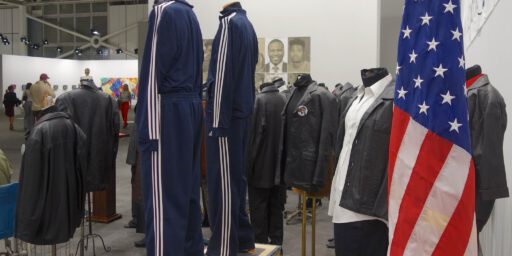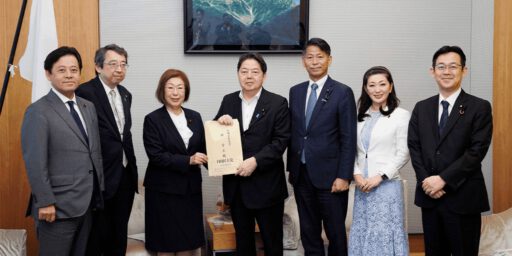For those who need help in Japan For those who need help in Japan
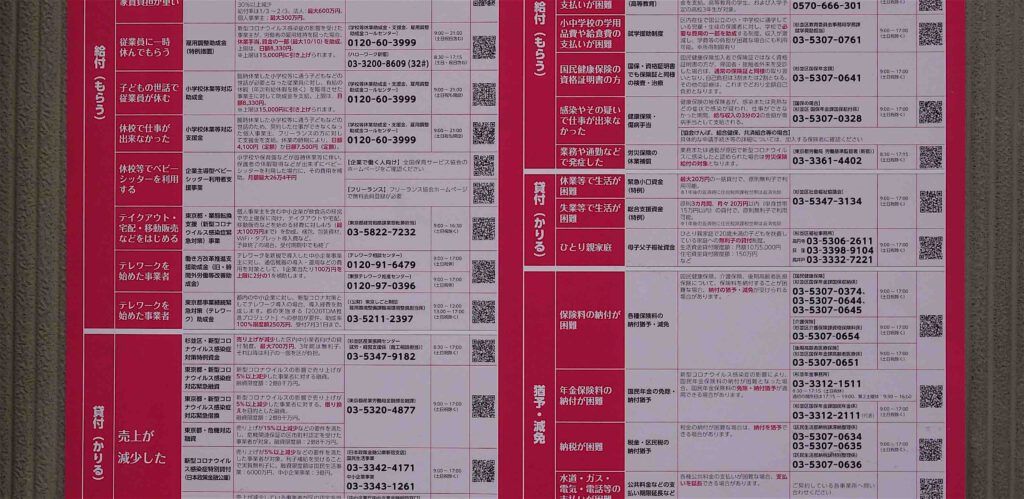
Please ask your Japanese friends, for sure they explain you what’s written on this poster.
聖イグナチオ教会での相談会と弁当配布は3日も正午から午後6時まで実施される。一般社団法人「社会的包摂サポートセンター」のウェブサイト(https://www.since2011.net/information/1903/)には、年始に全国各地で開かれている困窮者支援の民間窓口の一覧が掲載されている。また、厚生労働省もウェブサイトで、年始も開いている各自治体の相談窓口の案内を掲載している(https://www.mhlw.go.jp/stf/newpage_15468.html)。
“YOU ARE NOT ALONE” link
https://www.hitorijanai.org
ひとりじゃないよプロジェクトとは
コロナ危機は、不安定な雇用で働く人々を直撃しています。中でも打撃を受けているのは、120万世帯を超える母子世帯です。
厚生労働省 (平成28年度全国ひとり親世帯等調査結果) によると、ひとり親女性の年収は約200万円で、ひとり親男性のおよそ半分。貧困率は5割を超えます。私たちが行ったアンケートでは、シングルマザーが現在非常に厳しい状況に置かれていることがわかりました。仕事を失ったり、収入が激減して生活が立ち行かなくなっている母子世帯には、衣食住と学費を支えるための緊急支援が必要です。
私たちは、困窮する女性や子どもの支援活動をしている団体を支え、広く寄付を呼びかけることが急務だと考えました。 政府からの給付金などの寄付を考えている人もいるでしょう。その思いを、困っている女性や子どもの支援につなげられればと思います。
先日、親を亡くした学生などを支援するあしなが育英会が、高校生と大学生に一人当たり15万円、総額約10億円の生活資金を援助することを決めて、話題 (あしなが育英会、奨学生全員に15万円交付 新型コロナで緊急支援) になりました。その活動を支えるべく、多くの寄付が集まることを願います。
一方、母子世帯の約9割は、離別や未婚によるものです。子どもの立場で考えれば、理由にかかわらず、親がひとりであることに変わりはありません。コロナ危機で追い詰められる母子世帯の衣食住と、子どもたちの教育の機会を守らなければなりません。
また、ひとり親家庭だけでなく、失業や休業で大幅な収入減となった単身女性、アルバイト収入を絶たれた子どもたち、機能不全家族やDV・虐待から逃れて行き場を失い、シェルターに身を寄せる女性や少女たちもいます。 先進国で最も男女格差が大きい日本では、女性は不安定な雇用や賃金格差で構造的に弱い立場に置かれています。危機の際に最初に大きな打撃を受けるのです。
このサイトには、今すぐに必要な生活支援、学習支援、安全な居場所の確保などの活動を行なっている団体を集め、掲載しています。
是非、応援したい団体へのご寄付をお願い致します。女性と子どもの貧困は日本の大きな社会課題ですが、残念ながらまだ十分な関心が寄せられていません。
私たちの小さなアクションが、誰も取り残さない社会、助け合い共に生きる社会を作ります。思いを力に変えていきましょう。
ひとりじゃないよPJのアンケート結果をみる
COVID-19(新型コロナウイルス)感染防止対策に伴うシングルマザー家庭への影響調査を実施
https://drive.google.com/file/d/15mOWdpjGPRFpEb-VWjMEq2NUW_GF5Z8d/view
ひとりじゃないよPJ 活動報告記者会見
2020/7/10 「ひとりじゃないよPJ発足から2ヶ月コロナによる影響についてのアンケートと女性・子ども支援団体からの声を紹介」
https://drive.google.com/file/d/1x7srXVPSqZwKUoM9vhfj-M9kZYcldLV_/view
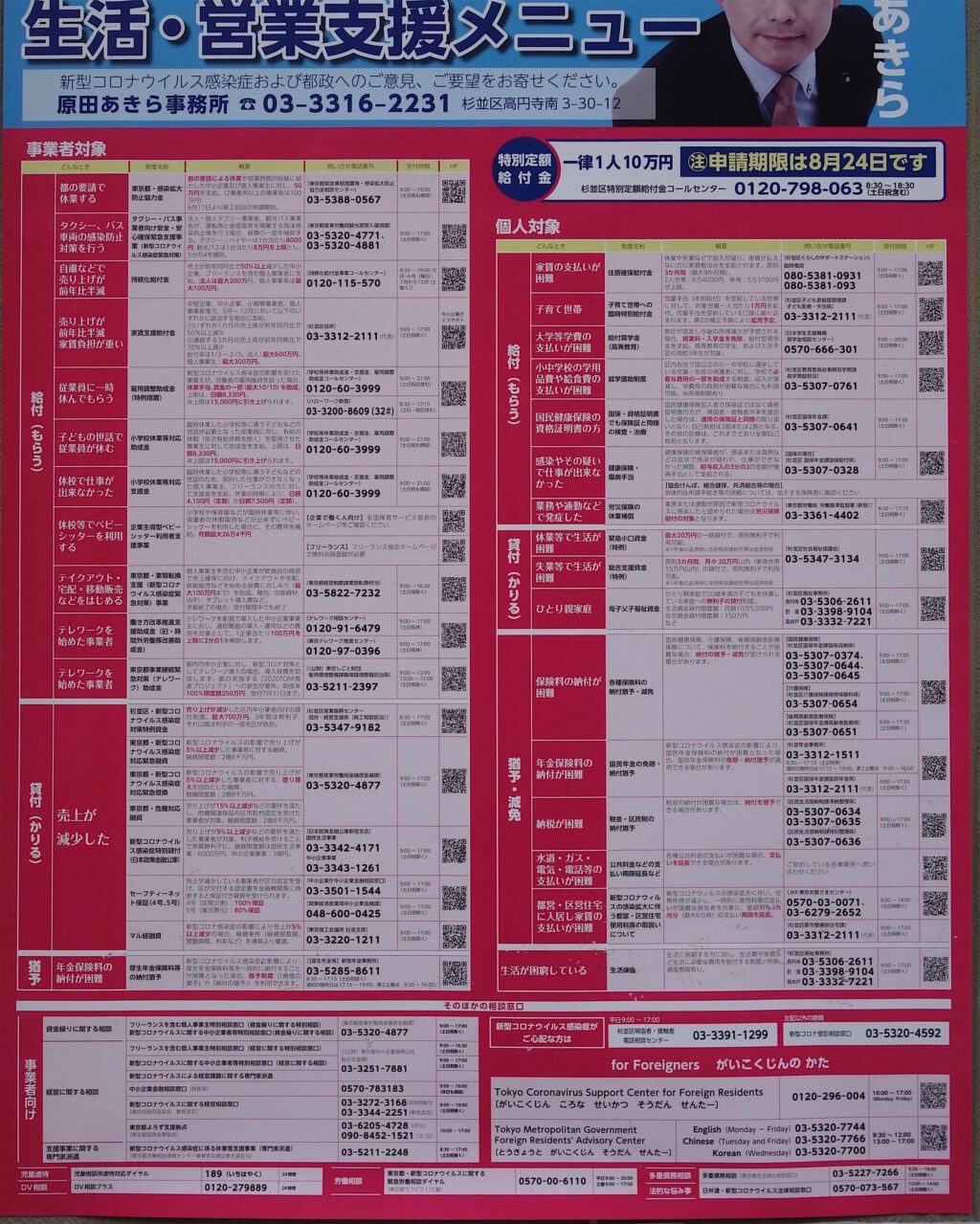
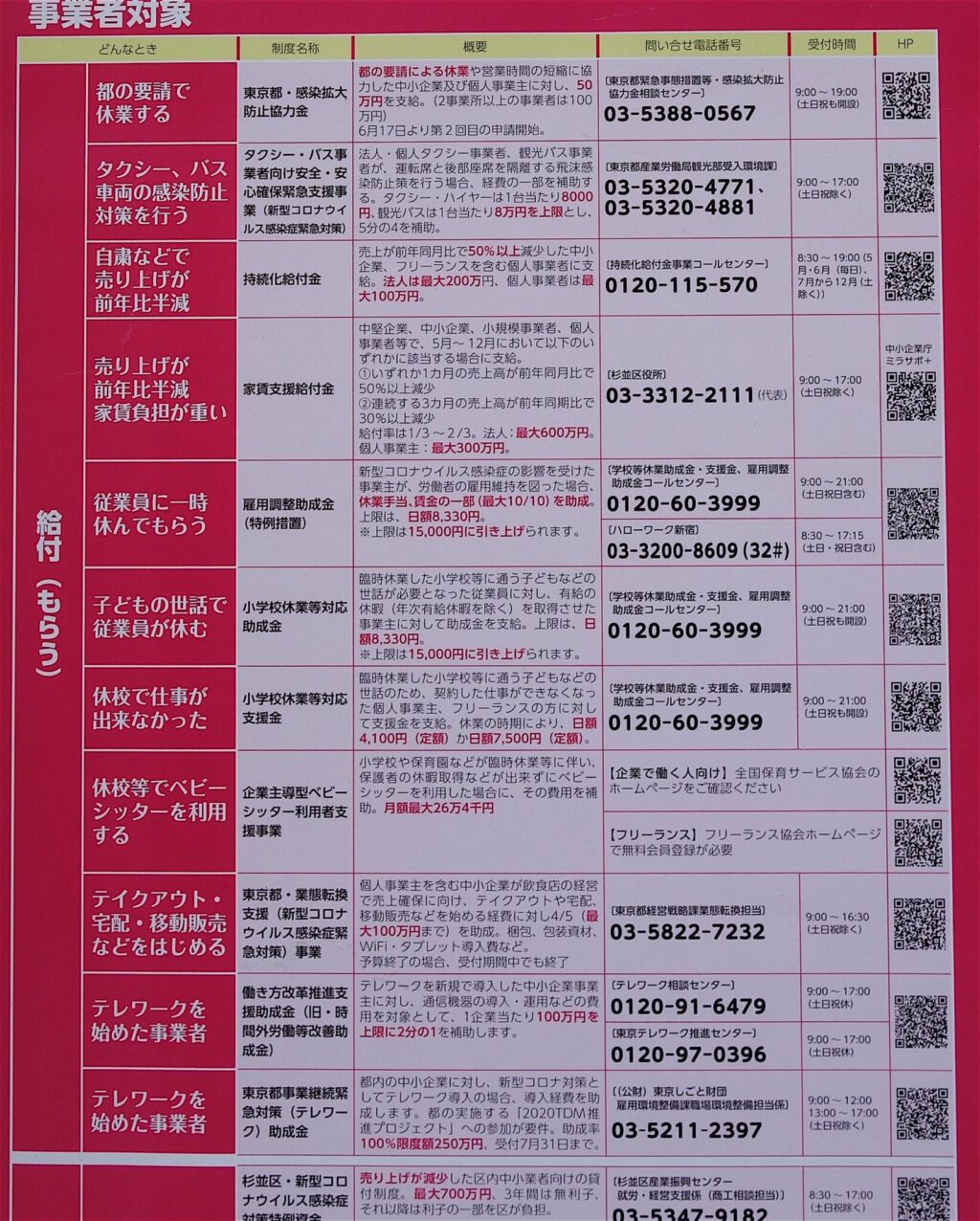
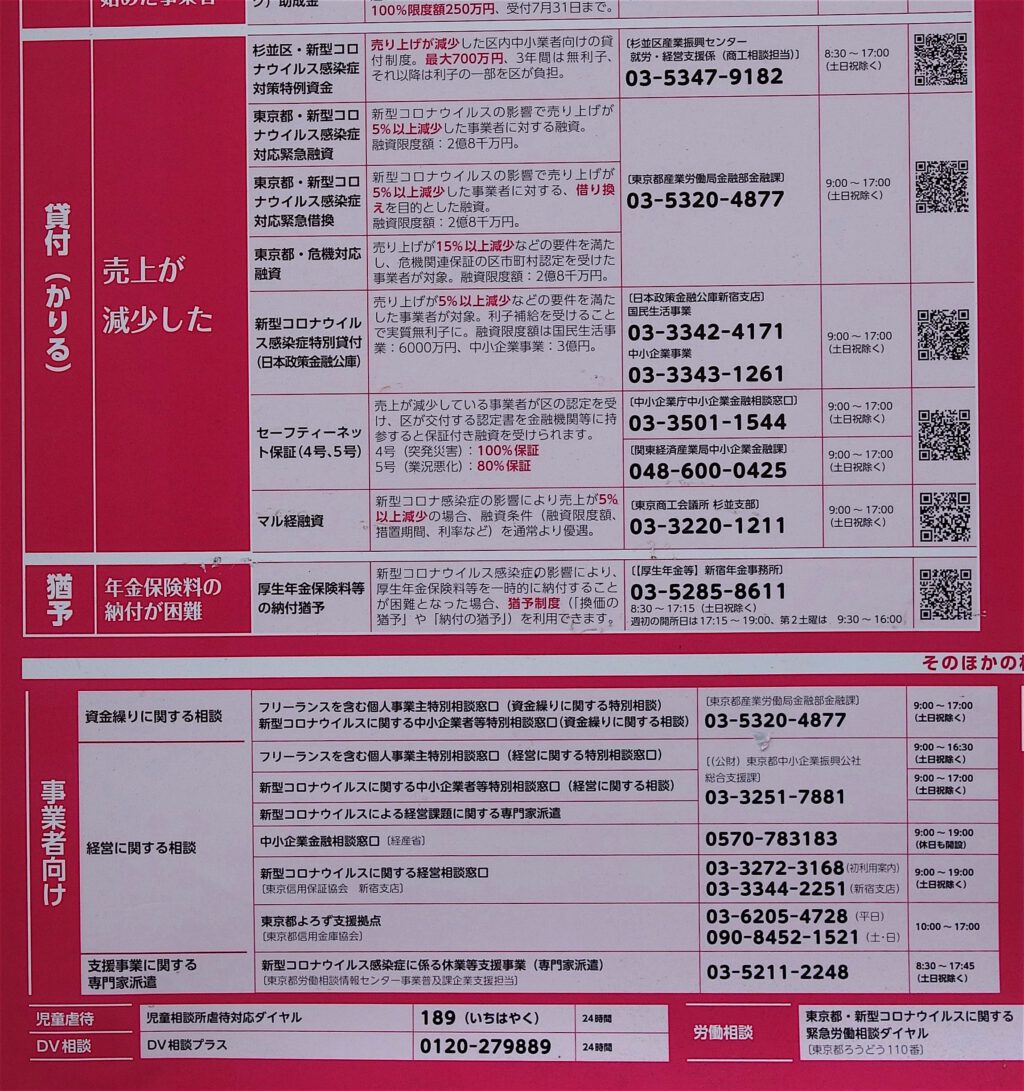
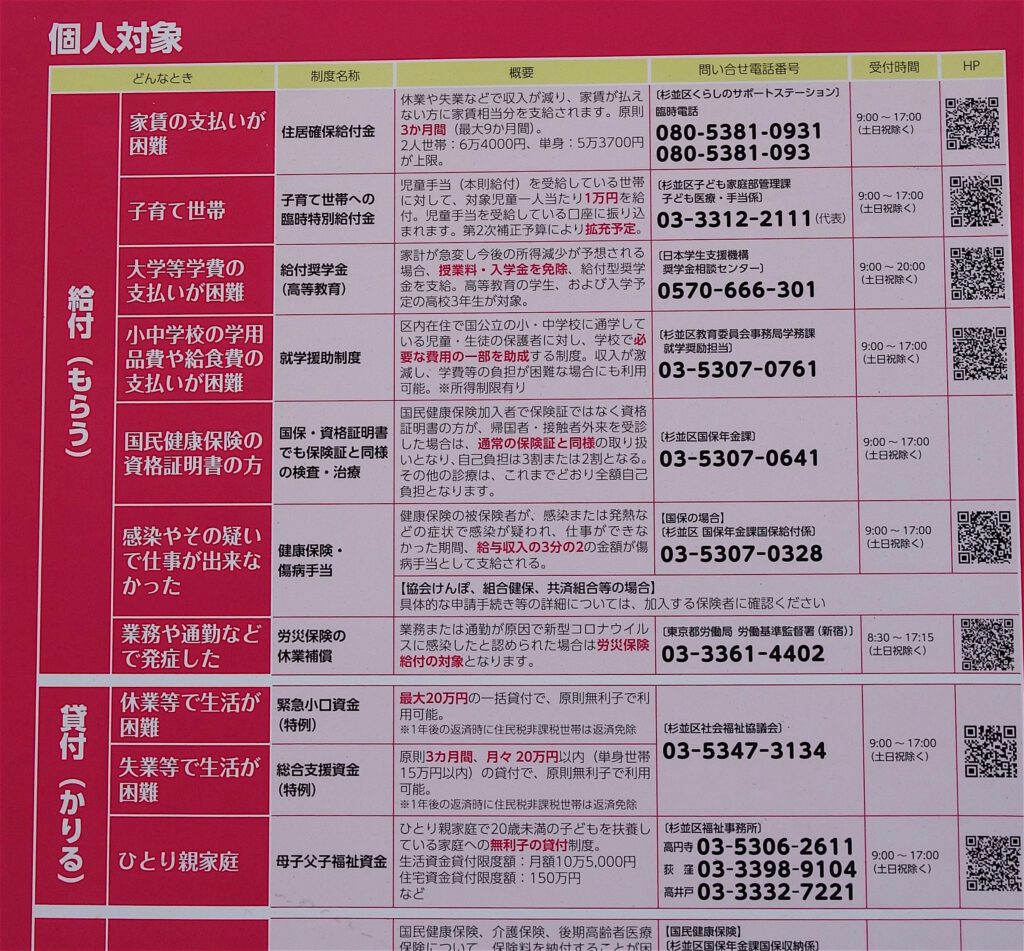
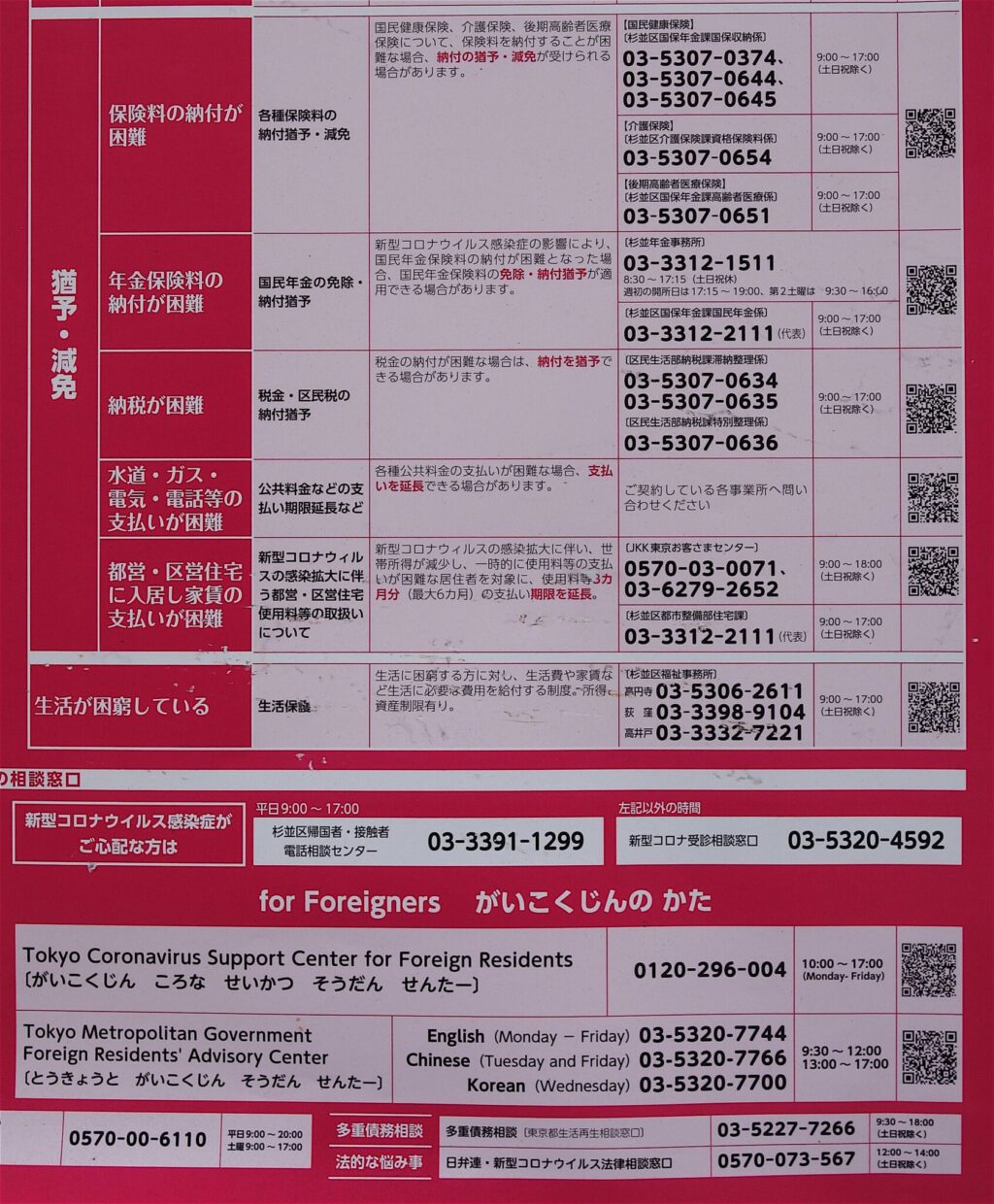
Women, families, foreigners in Tokyo food line as pandemic-induced poverty tightens grip
January 5, 2021
TOKYO — St. Ignatius Church in the capital’s Chiyoda Ward is busy this first New Year’s Day since the start of the coronavirus crisis, but not with worshippers. The economically hard-pressed people lined up at the Catholic church this day — young women, families, and foreign nationals among them — are there for the bento boxed meals being distributed to those in need.
“Self-help and mutual-help only go so far,” said a spokesperson for the main organization behind the “Toshikoshi Otona Shokudo 2021” (New Year’s adult canteen 2021) event. “Now is the time for public support. We want the government to take steps to stop a wave of people in poverty from ending up on the streets.”
The meals being handed out include the bento box and soup, while staff are also giving clothes to those who want them. In addition, there are professionals on-hand dispensing advice on labor issues and daily life problems.
One of the people there for the food was a 34-year-old graduate student carrying her 3-year-old daughter.
“This is the first time I’ve been to a place like this,” she said. “I thought they also might have medicines and children’s clothes.” Her income has plunged since the pandemic made it impossible for her to do her part-time job, while the suspension of her student loan repayments during the coronavirus crisis has been but a small help.
Another woman, a 44-year-old who worked as a part-time receptionist among other jobs, told the Mainichi Shimbun, “Parties have almost dried up because of the coronavirus, and I had nearly zero income in December.” She added that she’d had steadily less work since about March last year. In a normal December, she said, she’d pull in 600,000-700,000 yen (about $5,800-$6,800). Now, she has less than 200,000 yen left in savings and is several months behind in her public health insurance premiums. “If things go on like this for another month or two, I won’t have anywhere to live. I’m serious.”
In the 2008-2009 New Year’s period, just after the collapse of Lehman Brothers triggered the global financial crisis, a similar event for temporary workers who got laid off was held. Then, almost all the people coming to seek help were men. Not so this year, young women with babies and even whole families joined the same food line as the middle-aged men who live on the streets.
Cooking expert Nahomi Edamoto is overseeing the bentos. At first, she and her team made meals for 200 people, but these were all gone in about two hours. They cooked some more, and by 4:30 p.m. they had given out about 300 meals. Because of the coronavirus, the people had to eat them outside, on chairs set up along a nearby embankment. The day was sunny and relatively warm, so conditions were good.
Some foreign residents were also there for the meals. Ferbie Toledo, a 37-year-old English teacher from the Philippines, was there with his 35-year-old wife and their 6-month-old baby and their son, age 5. The family comes to St. Ignatius sometimes for mass, and was delighted when they learned of the bento event.
Toledo said he had been living in Japan for 10 years, but his classes were mostly cut because of the pandemic, while his wife, who also works as a teacher, has been on maternity leave since their youngest son was born in June 2020. He told the Mainichi that they are pinching every penny, but that the family’s savings are drying up. He hopes that his wife will be able to go back to work in April, and that the family will be able to hold out until then.
In the line for receiving professional advice was a 31-year-old Cameroonian, who said with a hardened expression that she didn’t have any food, money, or work. She arrived in Japan last February and filed a refugee claim. She was released from an Immigration Services Agency of Japan facility in June last year but had nowhere to go, and is now staying at a shared house in Tokyo’s Itabashi Ward introduced by a nongovernmental organization. She says she wants to get a residency status soon, but that the pandemic is slowing the process down. She added that she had no family left in Cameroon, and wanted to make Japan her home.
A 46-year-old Iranian woman had lost her part-time job at a meat processing company last year because of the coronavirus crisis. Now, she earns 9,000 yen (about $87) a day as a security guard at nighttime construction sites, and sleeps at a restaurant owned by a friend. She didn’t have health insurance when she was living at a shared house, and worried that she would catch the virus there. She told the Mainichi that little information on daily life support programs reached foreigners in Japan, while internet connections and the Japanese language were also tough hurdles. She then asked if there were any free Japanese language classes she could take.
“If things go on as they are, more and more people will be pushed out onto the streets with no way to support themselves,” said Tsuyoshi Inaba, of the Emergency action for covid-19 disaster and the Tsukuroi Tokyo Fund organizations, which backed the food giveaway.
When a state of emergency was declared last spring, internet cafes shut their doors, forcing day laborers who spent their nights at such establishments onto the street. And since October, people who have run through their savings after losing their jobs to the pandemic have apparently been joining them on the curbside in increasing numbers. More people in their teens and 20s are joining the ranks of Japan’s impoverished.
Tsuyoshi Inaba, one of the event’s organizers, is seen at St. Ignatius Church in Tokyo’s Chiyoda Ward on Jan. 1, 2021. He says that “we’ve reached the limits of self-help and mutual help.” (Mainichi/Sumire Kunieda)
Inaba believes it is important to expand continuous special coronavirus crisis cash payments and housing aid, and to bolster efforts to get the word out about welfare programs.
“There is a program to lend empty private houses to people who have lost their own homes, and I’d like to see full use made of that,” said Inaba.
(Japanese original by Sumire Kunieda and Aya Shiota, Integrated Digital News Center)
https://mainichi.jp/english/articles/20210104/p2a/00m/0na/019000c
年越し「大人食堂」に若い女性や家族連れ 自助の限界「住む場所なくなる」
毎日新聞2021年1月2日
新型コロナウイルスの感染が拡大してから初めての正月がきた。1日、東京都千代田区にある聖イグナチオ教会で、「年越し大人食堂2021」が開かれ、生活に困窮した人のための弁当配布や生活相談などが実施された。並んだ列の中には若い女性、家族連れ、外国人の姿があった。主催団体は「自助、共助は限界に来ており、今こそ公助の出番。政府は生活に困窮する人が路上にあふれることを阻止してほしい」と訴える。訪れた人たちの声に耳を傾けた。【國枝すみれ、塩田彩/統合デジタル取材センター】
弁当配布の列に女性の姿も
今回提供された食事は弁当やスープで、希望者には衣類も配布した。また、専門スタッフを置いて労働問題や生活の相談を受け付けた。
女児を抱いた若い女性に声をかけた。34歳の大学院生で女児は3歳。「こういう所にくるのは初めて。医薬品と子ども服をいただけないかと思って」。コロナ感染拡大でアルバイトができなくなり収入が減った。奨学金の返済がコロナで一時的に猶予されたのがせめてもの救いだという。
「コロナ禍で宴会が激減して12月は収入がほとんどなかった」。派遣コンパニオンなどとして働いてきた女性(44)は去年3月ごろから仕事が激減した。例年なら年末年始の宴会で月約60万~70万円を稼いでいた。手元の預貯金は残り十数万円になり、健康保険料を数カ月分滞納したという。「この状態があと1、2カ月続けば、本当に住む場所もなくなってしまう」
弁当を配る列には、路上生活者の中年男性に交じり、赤ちゃんを抱いた女性や家族連れの姿があった。リーマン・ショック後、2008年から09年にかけて「年越し派遣村」が開かれたが、その際はほとんどが男性だったのに……。
この弁当は、料理研究家の枝元なほみさんが調理を担当した。当初は200人分を用意したが2時間ほどで配り終えたため、追加で作って午後4時半までに約300個が配られた。だがコロナ対策のためテークアウトで、弁当をもらった人は会場近くの土手に設置された椅子に座って食べていた。1日は晴天で日差しが暖かかったから、本当によかった。
外国人に情報届きにくく
新型コロナは日本に滞在する外国人も苦しめていた。
フィリピン人で英語教師のフェルディ・トレドさん(37)は6カ月の赤ちゃんを抱いた妻(35)と5歳の息子とで弁当を広げた。たまたま教会のミサに来たのだが、弁当が配られていると知り、大喜びで受け取った。
日本での滞在は10年になる。コロナ禍で受け持っていた授業数が激減し、6月には同業の妻が出産してその後育休に入った。「生活費を精いっぱい切り詰めているけど、貯金をきり崩す生活。4月には妻が職場復帰できるはずだから、それまでなんとかもたせたい」
「食べ物、お金、仕事、何もない」。カメルーン人のジェネット・アンジェイクさん(31)は硬い表情で生活相談の順番を待っていた。昨年2月に日本に来て、難民申請をした。出入国在留管理庁の施設から6月に解放されたが、行く当てもなく、NGOを頼って東京都板橋区のシェアハウスに暮らす。「早く滞在許可が欲しい。でもコロナで全ての手続きがスロー。カメルーンにはもう家族はいないから、日本を私のホームにしたい」
イラン人のアリアム・ファルサさん(46)は新型コロナの影響で昨年、精肉会社のパート職を失った。いまは日給9000円で夜間工事現場の警備員として勤め、知人の飲食店に寝泊まりする。シェアハウスに暮らしていたときは健康保険がなく、新型コロナ感染が怖かった。「外国人には生活支援情報が届きにくい。ネット環境と日本語がハードル。日本語を無料で勉強できるクラスを知らない?」。真剣な表情で尋ねてきた。
「このままでは、ますます多くの人が路上に押し出され、路頭に迷う」。今回の大人食堂を主催した「新型コロナ災害緊急アクション/つくろい東京ファンド」の稲葉剛さんは危機感を強めている。
昨年春の緊急事態宣言のときは、ネットカフェが休業した。そのため、日雇いでネットカフェで寝泊まりしていた人たちが路上に押し出された。10月以降はコロナの長期化により、失業して貯金を切り崩した末、家賃が不払いとなり路上で暮らす人たちが増えているという。生活困窮者の年齢層は10代、20代にまで広がっている。
稲葉さんは、特別定額給付金の継続的な給付や住宅支援の拡充、生活保護制度の積極的な広報などが重要と考えている。「民間の空き家を借り上げ住む家を失った人に提供する『みなし仮設住宅』があるので、活用してほしい」と訴えた。
聖イグナチオ教会での相談会と弁当配布は3日も正午から午後6時まで実施される。一般社団法人「社会的包摂サポートセンター」のウェブサイト(https://www.since2011.net/information/1903/)には、年始に全国各地で開かれている困窮者支援の民間窓口の一覧が掲載されている。また、厚生労働省もウェブサイトで、年始も開いている各自治体の相談窓口の案内を掲載している(https://www.mhlw.go.jp/stf/newpage_15468.html)。
COVID-19 Multilingual Support Project
https://covid19-tagengo.com
「COVID-19 多言語情報ポータル(以下当ウェブサイト)」は、主に首都圏の在留外国人に向けて、新型コロナウイルスの感染予防策や安心・安全な生活を続けるために必要な幅広い情報を多言語で発信する非公式サイトです。
当ウェブサイトは、上記の情報発信を目的として、「COVID-19 多言語支援プロジェクト(以下当プロジェクト)」によって運営されています。
https://covid19-tagengo.com/about-us/
https://covid19-tagengo.com
Financial Support / Money
Supports available when money is tight because of COVID-19
https://covid19-tagengo.com/category/en/money/
1. 公的な支援
まず公的な支援について。
◆TOKYO チャレンジネット
東京都内に直近6ヶ月在住している失業者などが対象。(6ヶ月未満の方は、次の項目をご覧ください)。
一時的に無料でビジネスホテルに入り、その後あなたの状況に適した支援に繋がることができます。
混雑すると感染リスクが高まるので、直接窓口に行く前に、以下から予約してください。予約が取れたら窓口に行き、「ネットカフェ等で暮らしていたが泊まれなくなったので一時住宅(ホテル)の提供を受けたい」と伝えてください。ホテルを紹介してくれるので「利用票」を受け取ってください。ホテルでは食事(お弁当3食)提供されるようです。そして後から詳しい相談をし、あなたの状況に適した支援に繋がることになります。(チャレンジネットの事業や生活保護など)
相談受付窓口;月・水・金・土曜 午前10時~午後5時/火・木曜 午前10時~午後8時
場所:〒160-0021 東京都新宿区歌舞伎町2-44-1 東京都健康プラザハイジア3F(西武新宿駅徒歩2分またはJR新宿駅徒歩7分)
フリーダイヤル 0120-874-225 女性専用フリーダイヤル;0120-874-505
パソコンからの予約はこちら
https://www.tokyo-challenge.net
TOKYOチャレンジネット
〒160-0021 東京都新宿区歌舞伎町2-44-1 東京都健康プラザハイジア3F
TEL:0120-874-225 / 0120-874-505(女性専用ダイヤル)
TOKYOチャレンジネットとは
東京都では、インターネットカフェや漫画喫茶などで寝泊まりしながら不安定な就労に従事している方や離職されている方に対して、サポートセンターであるTOKYOチャレンジネットを設置し、生活支援、居住支援、就労支援及び資金貸付相談などを実施しております。
◆各区の福祉事務所または自立相談支援機関
都内に6ヶ月未満の方はこちらに。一般的に生活保護申請などを受け付ける窓口である各区の福祉事務所や、生活困窮者自立支援制度の自立相談支援機関からも上記のホテルを利用することが可能です。これまで過ごしていたネットカフェ等と同じ区内にある福祉事務所または自室相談支援機関に問い合わせてみてください。その際には「ネットカフェ等で暮らしていたが泊まれなくなったので一時住宅(ホテル)の提供を受けたい」と言ってください。こちらは、相部屋の施設を紹介されることもありますが、感染リスクを下げるために個室を確保したい場合は、「相部屋は無理なので、都の用意したホテルを紹介してください。4月17日付の事務連絡を確認してください」と言ってください。ホテルを紹介されたら「利用票」を貰ってください。ただし、区によって食事が提供されない場合もあるようです。さらにあとから詳しい相談をして適した支援につながることになります。また、現時点で収入と住まいが無い方は福祉事務所へ相談されたほうがスムーズなようです。
ただし、緊急的な対応のため区によっては受け付けていないと言われたり、スムーズにいかない場合もあるかもしれません。その場合は、次の項目で紹介するの民間支援団体に相談してください。
都内の福祉事務所はこちら;福祉事務所一覧
https://www.fukushihoken.metro.tokyo.lg.jp/smph/seikatsu/shisetsu/fukushi.html
2. 民間支援団体への相談
次に、民間支援団体への相談窓口です。
◆つくろい東京ファンド
https://tsukuroi.tokyo
●主な対象の方:
緊急事態宣言が出された地域において、普段ネットカフェ等に住まわれ、今回の宣言を受け休店により行き場をなくされた方および、なくしそうな方
●出来ること:
ご状況をうかがい、使える制度のご紹介。必要に応じて連携ソーシャルワーカーによる直接相談と当面の緊急宿泊費(ビジネスホテル代分)の提供など。
相談フォーム;緊急事態宣言の影響でネットカフェ等に泊まれなくなり、お困りの方からの相談受付フォーム
https://docs.google.com/forms/d/e/1FAIpQLScyZ19a_3uj87PQGsWknPlcN_TLGWayoBL10kZS1KgLH5OKAg/viewform
◆ホームレス総合相談ネットワーク
http://lluvia.tea-nifty.com/homelesssogosodan/
http://lluvia.tea-nifty.com/homelesssogosodan/2020/04/post-e9fd61.html
法律家のグループによる相談窓口です。
電話相談窓口;平日午前11時から午後5時 フリーダイヤル 0120-843-530
お知らせ動画;コロナ感染症の影響で生活が困窮した方へ~8~緊急事態宣言発令中はフリーダイヤルによる電話相談を拡大対応しています!ほかにも生活保護申請の方法についての動画をUPしています。
https://www.facebook.com/homeless.sogosodan/
◆自立生活サポートセンター・もやい
https://www.npomoyai.or.jp
ネットカフェ等にいられなくなってしまった方,新型コロナ の影響で収入が減ってしまった方など、ご相談を伺います。相談会では、必要に応じて、宿泊場所の紹介や宿泊費の支援、生活費の支援、生活物資の提供、公的支援利用のためのサポート等をおこないます。
電話相談:火曜日12時~18時, 金曜日11時~17時 03-6265-0137
相談会:火曜11時~17時 (もやい事務所:新宿区山吹町362番地みどりビル2階)
土曜14時~15時 (都庁前:都営地下鉄「都庁前」駅E1出口)※土曜は臨時相談。5月以降も継続予定ですが、まだ正式には決まっていません。
メール:info (at) npomoyai.or.jp (随時)
また、相談会では、必要に応じて、宿泊場所の紹介や宿泊費の支援、生活費の支援、生活物資の提供、公的支援利用のためのサポート等をおこないます。
※以下は、その他の曜日に相談ができます。
◆認定NPO法人ビッグイシュ-基金
https://bigissue.or.jp
路上生活をされている方、ネットカフェ等にいられなくなった方に向けて支援を行っています。現在、事務所にて支援情報や、寄付でいただいた保存食、食券、衣類をお渡ししています。
日時:XYZ いずれも午前11時~12時
場所:新宿区水道町4-28 JC江戸川橋ビル2階(メトロ有楽町線「江戸川橋」駅 徒歩5分、メトロ東西線「神楽坂」駅 徒歩7分、各線「飯田橋」駅 徒歩13分)※お訪ねの際はインタ-ホンを押してください
連絡先:電話:03-6380-5088
※この食料品配布は、東京都に非常事態宣言が発出されている間の緊急支援です
※緊急事態宣言などの動向によって、予告なく中止となる可能性があります
◆特定非営利活動法人TENOHASI
https://tenohasi.org
https://tenohasi.exblog.jp/31133733/
池袋で活動する支援団体です。衣料配布、炊き出しや生活相談、医療相談を行っています。本日の夜回り活動の際にも相談可能ということですので記載させていただきます。
生活相談:YXZ の第2第4土曜日の開催です。
(16:30衣料配布、18:00弁当配布。詳しくはこちら)
場所:池袋駅前公園 (うなぎ公園、ビックカメラ本店裏)
https://poteto.media
【決定版】郵送サポート可能なコロナ対策制度8選
https://poteto.media/corona/【決定版】郵送サポート可能なコロナ対策制度8選/
生活保護制度
https://www.mhlw.go.jp/stf/seisakunitsuite/bunya/hukushi_kaigo/seikatsuhogo/seikatuhogo/index.html
HELP FOR FOREIGNERS regarding unemployment
雇用保険外国人向け英語版パンフレットの掲載
https://jsite.mhlw.go.jp/mie-roudoukyoku/news_topics/topics/280304/njgjli.html
雇用保険の受給について(Guide for receiving unemployment insurance benefits)
https://jsite.mhlw.go.jp/mie-roudoukyoku/var/rev0/0113/4985/2016102718759.pdf
○ 「雇用保険の失業給付受給者のしおり」 (Unemployment Insurance Benefit Manual)(1567KB; PDFファイル)
https://jsite.mhlw.go.jp/mie-roudoukyoku/var/rev0/0113/4986/2016102718958.pdf
住居確保給付金について
https://www.mhlw.go.jp/file/06-Seisakujouhou-12000000-Shakaiengokyoku-Shakai/0914_shiryou03_1.pdf
社会福祉協議会(しゃかいふくしきょうぎかい、Social Welfare Council)とは、行政関与によって戦前から戦中に設立した民間慈善団体の中央組織・連合会(「中央慈善協会」「恩賜財団同胞援護会」「全日本民生委員同盟」「日本社会事業協会」など)およびその都道府県組織を起源とする組織で、地域福祉の推進を図ることを目的とする民間団体。略して社協と称する。
https://ja.wikipedia.org/wiki/社会福祉協議会
新型コロナの資金繰り制度「セーフティネット保証4号」とは
https://jfc-guide.com/news/17649/
創業融資ガイドは、株式会社SoLaboの運営する、
創業融資にまつわるノウハウを紹介するサイトです。
https://jfc-guide.com
Return To Japan Support Group
https://www.facebook.com/groups/returntojapan
雇用調整助成金
(新型コロナウイルス感染症の影響に伴う特例)
【事業主の皆さまに、雇用調整助成金を活用し雇用維持に努めて頂けるよう、令和3年2月28日まで特例措置を実施しています】
https://www.mhlw.go.jp/stf/seisakunitsuite/bunya/koyou_roudou/koyou/kyufukin/pageL07.html
Ministry of Health, Labour and Welfare
https://www.mhlw.go.jp/english/
—-
up-date:
Vietnamese technical trainee, 24, who loved Japan dies alone leaving wife and baby son
January 6, 2021 (Mainichi Japan)
quote:
The next day — Saturday, Nov. 7 — the president’s wife took Trong to a nearby hospital which, to prevent in-hospital infections, wasn’t doing X-ray examinations or blood tests for patients suspected of coronavirus infection. He received medication including antibiotics and a referral letter to another hospital. The president’s wife bought him an onigiri rice ball, but he didn’t have the energy to eat it even after it was soaked and softened in water.
quote:
The supervising organization for the intern program, which has a responsibility to protect technical intern trainees, received calls for help by Trong himself and his colleagues two days before he died. But the organization reportedly “asked” the company to take Trong to the hospital as his assigned interpreter had other tasks. The supervising organization commented, “One interpreter is responsible for one hundred to two hundred interns. Even if we can ask the company, we cannot order them to carry out a task.”
quote:
There had apparently been an incident in which he was swindled out of 250,000 yen (about $2,420) in Japan when trying to send it to his family, but she didn’t divulge any further details. It may be that Trong’s habit of enduring situations led to the tragedy of his disease.
quote:
Technical intern trainees have effectively been supporting Japan’s industries, which are suffering labor shortages. Kawasaki said, “Vietnamese laborers are present not only in the field, but also in this lodging too, as well as the convenience store right around the corner.”
quote:
The funeral lasted just over an hour. In their closing remarks, the monk said, “He lived in Japan for two years, and said that he loved Japan.” Stifled sobs could be heard from those present.
https://mainichi.jp/english/articles/20210106/p2a/00m/0fe/008000c
日本を愛したベトナム人青年 なぜ24歳で死ななければならなかったのか
毎日新聞2021年1月3日
https://mainichi.jp/articles/20201231/k00/00m/040/213000c
日本人と結婚したらすぐ永住権取れると思っている人が多いるらしいので、たくさんの人たちの事実を説明します。
Link_to_https://twitter.com/inkimono1/status/1346443870863650820
見た目だけで判断しないで
NHK 2021年1月5日
「外国人に間違えられる」
…
岩澤さん
「相手を日本人だと思っている場合は、『日本語上手ですね』ってたぶん言わないと思うんです。それくらい無意識に外見で判断しているということです。外見で日本人じゃないと思ってしまうのはしかたがないとしても、どういう言動をとるのかは、その人の意識次第ではないでしょうか。相手の気持ちを想像しながら、その場その場で判断してもらえたらと思います」
https://www3.nhk.or.jp/news/html/20210105/k10012781821000.html
Language barrier hinders care for infected foreigners
January 7, 2021
A Nepalese man who lives in Kanagawa Prefecture tested positive for the novel coronavirus, but after some misunderstandings, he decided against self-isolation and stayed at home.
His family members later tested positive.
Although the government has named foreign communities in Japan as sources of cluster infections, many non-Japanese say they are not receiving adequate information about the pandemic and what steps to take to avoid the contagion.
The language barrier is cited as the biggest reason.
In addition, some foreign nationals tend to conceal their infections out of fear of losing their jobs or facing further discrimination.
Shakya Sandeep, a 38-year-old doctor and a member of the Japan branch of the Non-Resident Nepali Association (NRNA), heard about the Nepalese man’s case in early May last year.
The man, who works as a cook at a curry restaurant, tested positive after he suffered from a headache, mild fever and a sense of fatigue.
The prefectural government arranged for the man to be transferred to an accommodation facility for treatment. A public health center provided a courtesy car to pick him up from his home.
But the Nepalese cook decided not to go.
He realized that he would have to read and write Japanese to fill out daily reports on his health condition, but he didn’t have the language skills to perform that task.
He also assumed the meals provided to patients at the facility would not accommodate his religious practices.
But Sandeep said he heard that another reason for the Nepalese man’s refusal to leave his home was that he was worried about the expenses.
The infected man apparently did not know that public funds cover all the costs of isolating COVID-19 patients at accommodation facilities.
Sandeep, who came to Japan at the age 18, graduated from Tokyo Medical and Dental University and has worked as a cardiovascular internal medicine doctor for 13 years. He delved further into the situation at foreign communities during the pandemic and said he was shocked at what he found.
One Kanagawa prefectural government official admitted that some patients who could not speak Japanese were not allowed to stay at the accommodation facilities at the beginning.
Sandeep joined a pandemic-related panel established by the branch in March 2020, when the novel coronavirus was spreading rapidly around Japan.
The 28 panel members, including health care workers and interpreters, have tried to spread information about anti-virus measures in Nepalese through videos and other means.
“Expat communities are vulnerable to exposure to the virus unless they share necessary information,” Sandeep said.
The Cabinet Secretariat, after analyzing domestic news reports and interviewing public health centers, confirmed at least 20 infection clusters involving foreigners from Sept. 1 to Nov. 10.
The clusters occurred at dormitories, workplaces and at restaurants where employees entertain customers.
The central government’s expert panel on dealing with the COVID-19 pandemic in September suggested strengthening the support system for foreign communities to prevent such infection clusters from occurring.
Since then, the government has formed a team to discuss measures to help foreigners survive the pandemic.
Takashi Sawada, 60, who heads the Minatomachi Medical Center in Yokohama that has treated many foreign patients, said he was interviewed by the central government.
He said he told the officials that information services were needed particularly for Vietnamese, Nepalese and Indonesians, who have increasingly settled in Japan’s labor force.
The health ministry in June 2020 started providing a free interpretation service for phone calls from health care workers.
The 24-hour service initially covered five languages–English, Chinese, Korean, Spanish and Portuguese. In December, French and Vietnamese were added.
Based on a suggestion from the central government’s panel, the ministry included expenses in third supplementary budget for fiscal 2020 so that public health centers nationwide could start using the interpretation service as early as Dec. 25.
But the ministry has not decided on whether to include other languages, such as Nepalese and Indonesian.
Another fee-based telephonic interpretation service that covers less-common foreign languages has been available to medical institutions since before the pandemic. The first five minutes cost 1,500 yen ($14.50) and 500 yen for every additional minute. The ministry said health-care providers can charge the fees to the patients.
Sawada said the cost is one reason foreign nationals are hesitant to use that service.
“In order to thoroughly contain the infectious disease, there needs to be an environment where people, regardless of their economic status, can smoothly access health care,” Sawada said.
Other problems stand in the way of containing the virus in foreign communities.
‘SHUNNED BECAUSE I AM A FOREIGNER’
Zoya Verzbitskaya, a 38-year-old Russian living in Tokyo’s Meguro Ward, said she was told by a dentist in May, “We can’t see a patient whose native language is not Japanese.”
At that time, the COVID-19 situation in many European countries had rapidly deteriorated.
Verzbitskaya, who studied Japanese literature at a graduate school in Japan and now works at a Japanese cosmetics company, said she thought the dentist “politely shunned me because I am a foreigner.”
“I have peacefully lived as a member of Japanese society. But once the pandemic hit, I felt like society treated me as the ‘other,’” she said.
At a discussion held by the government’s panel in September, some experts expressed concerns that foreigners would likely become targets of prejudice and discrimination in the health crisis.
Sandeep said he has heard about cases in Chiba Prefecture, where he works, in which medical staff have not given basic examinations to patients because they were not Japanese. The staff instead recommended that the patients go to a large hospital.
He also noted that foreign nationals are afraid of losing their jobs if they contract the novel coronavirus.
“If they are worried about being discriminated against and feel concerned about their lives, they are likely to hesitate to speak about any change in their health condition,” Sandeep said. “Even if their access to health care services is improved, it will not solve the problem.”
An estimated 2.89 million foreign nationals lived in Japan as of the end of June 2020, a significant increase from around 1990.
Chinese nationals lead the pack with 790,000, followed by 440,000 South Koreans and 420,000 Vietnamese. There were also 280,000 Filipinos, as well as 210,000 Brazilians, 100,000 Nepalese and 70,000 Indonesians.
http://www.asahi.com/ajw/articles/14088798
https://www.kimiwillbe.com
Since 1987, Kimi has been assisting expats in finding that perfect home at a fair price and providing job placement services for teachers all over Japan. We have some of the highest achievements and are one of the most trusted job/apartment services used by foreigners both in Japan and overseas.
When it comes to job-searching in Japan, be it for a part-time position or full-time position, you can turn to us to help you to find the jobs that you are looking for. View job listings for English-teaching positions, and get valuable advice about everything from apartment-hunting to translation services.
For accurate, up-to-date information and courteous assistance with everything you need to get your life on track, please enroll as a free member!
経産相 緊急事態宣言に伴う飲食店取引先などへ「一時金」発表
2021年1月12日 12時31分 新型コロナ 経済影響
梶山経済産業大臣は12日、閣議のあとの会見で首都圏の1都3県への緊急事態宣言に伴い、営業時間を短縮した飲食店の取引先や、外出自粛の影響を受けた事業者に対して、売り上げの減少を条件に中堅・中小企業は最大40万円、個人事業主は最大20万円の一時金を支給することを明らかにしました。
このなかで梶山経済産業大臣は「緊急事態宣言が再発令され、飲食店の時短営業や不要不急の外出自粛などでは、しっかりとした対策を講じることとなった。厳しい状況に置かれる企業などについて政府として一時金による支援を行う」と述べ、緊急事態宣言に伴って新たに一時金を支給する方針を明らかにしました。
具体的には一時金の対象は、時短営業を行う1都3県の飲食店との間で直接的、または間接的に食材や商品などを取り引きしている業者や、外出自粛の影響を受けた事業者とします。
いずれも1月または2月の売り上げが去年の同じ月と比べて50%以上減少したと認められることが条件で、一時金の額は、中堅・中小企業が最大で40万円、個人事業主は最大で20万円としています。
梶山大臣は「引き続き産業界の経済環境をしっかり注視しながら適切な対策をとっていきたい」と述べました。
https://www3.nhk.or.jp/news/html/20210112/k10012809741000.html
‘Please help’: Homeless man’s sign highlights struggle for Japan’s young, poor in pandemic
January 14, 2021 (Mainichi Japan)
TOKYO — “Please help I’m struggling because of corona and other things,” read the words on a piece of cardboard held up by a man, his head hung low as he sat against a wall near the west gate to JR Shinjuku Station, one of the capital’s busiest stations.
•
I saw him amid the crowds on the night of Jan. 7, after a state of emergency was declared in Tokyo and neighboring prefectures. A passerby dropped some coins into a small bowl the man had put in front of him, and said, “It’s not much, but…” He thanked them.
When the man finally raised his head, I approached him to try to find out more about him. It turned out he was 35; he said he lost his job to the coronavirus and had since been unable to find new work. Over the New Year holiday he stayed at a friend’s house, but said that he couldn’t be dependent on them forever, and now he’s begging for money while living on the streets.
The Tokyo Metropolitan Government has prepared 1,000 hotel rooms to temporarily accommodate poor homeless individuals, but the man said he’d only “heard about the program from an acquaintance” and was unaware of how specifically to receive the aid. “In any case, I’m jobless because of the coronavirus. That’s it,” he said before looking down again.
I was still worried about him after I left, so I went back to where he was about 20 minutes later to give him a slip with contact details for the Tokyo Metropolitan Government’s consultation services. But he was already gone. A young man and woman who were standing near where he’d been told me, “He was here three days ago too, and we’ve seen him around for quite a while now.”
“There are many others out there struggling in the same way, especially among young people,” said Ren Onishi, 33, director of certified incorporated nonprofit organization Moyai Support Centre for Independent Living that helps those in poverty. The slump in economic activity brought on by the pandemic is taking its toll on nonregular workers, day laborers and others with unstable working arrangements.
According to a survey by the Ministry of Health, Labor and Welfare, as many as 80,000 people in Japan have been laid off or seen their employment contracts terminated for coronavirus-related reasons. On Jan. 9, more than 200 people had received food provisions distributed in front of the Tokyo Metropolitan Government building as part of a program Onishi is involved in. The number of recipients set a record high, and was 2.5 times those in the same period of the previous year.
National and local governments have taken measures, too. As mentioned previously, the metropolitan government has since Dec. 21, 2020, made 1,000 hotel rooms available to people in need including individuals who planned to spend the New Year holiday at internet cafes. Following the state of emergency declaration, it also extended the period for applications to use them to Feb. 7.
At a Dec. 25, 2020, press conference, Minister of Health, Labor and Welfare Norihisa Tamura made a rare call to members of the public to seek livelihood assistance, saying, “People who are really struggling have the right to receive benefits, so I’d like them to apply without hesitation.” The Japanese government has also established a variety of aid programs, and appears poised to respond to the current emergency.
But even if this aid framework is established, it won’t lead to any support if information about it is not conveyed to people who need it. Despite the expectation that individuals who sleep in internet cafes and other places will account for a large proportion of hotel room program users, the metropolitan government has not asked internet cafes to inform its customers about the help available, and a representative of the metropolitan government’s community welfare section said they do not plan to do so in future.
Support workers in the field have reported hearing from many people claiming they weren’t aware of their eligibility to stay at hotels. A metropolitan government source revealed just 235 people had used the program as of Jan. 4.
Additionally, the aversion to welfare shown by some individuals in need also appears to be an obstacle. Onishi told the Mainichi Shimbun that even if people in need are able to reach support services, there are cases of them expressing strong resistance to receiving livelihood assistance and other support.
“In Japan, poverty is seen as a matter of ‘personal responsibility.’ Those who think this way should be approached and persuaded so they can feel at ease in using support services,” said Onishi. He added, “It’s not enough to just open consultation services and wait for people to come. I want administrative institutions to take the lead in cooperating with private support groups so that individuals can use services more proactively.”
Will sufficient support reach poor people amid the chaos of the “third wave” of coronavirus infections? When I went back to Shinjuku Station on the night of Jan. 9, the homeless man was nowhere to be seen.
— Consultation services
Tokyo Challenge Net, a social service provided by the Tokyo Metropolitan Government, can be reached by calling 0120-874-225 (Japanese language only) or 0120-874-505 (for women only, and Japanese language only)
https://www.tokyo-challenge.net/
Guidance on temporary loan emergency funds and other support can be found on the Ministry of Health, Labor and Welfare website:
https://www.mhlw.go.jp/stf/newpage_13694.html (in Japanese)
https://corona-support.mhlw.go.jp/seikatsufukushi/en/index.html (in English)
(Japanese original by Shinji Kurokawa, City News Department)
https://mainichi.jp/english/articles/20210113/p2a/00m/0na/024000c
コロナで「困っています」物乞いする35歳 うつむく困窮者に届かぬ支援
首都圏で新型コロナウイルスの緊急事態宣言が出された今月7日夜。JR新宿駅(東京都)の西改札付近を歩いていると、一人の男性の姿が目に入った。雑踏の中で柱を背に座り込み、うつむいている。手に掲げていた段ボールの切れ端には「コロナ等で色々困ってます お願いします」と書かれた文字。通行人が「少ないですけど」と足元のおわんに小銭を入れていく。「ありがとうございます」。男性はやっと視線を上げた。
話を聞こうと声を掛けた。男性は35歳。コロナ禍で職を失い、再就職もかなわなかった。年末年始は友人宅に身を寄せたが、いつまでも頼るわけにはいかず、路上で過ごしながら「物乞い」をしているという。
都は住まいがない困窮者向けに一時滞在用のホテル1000室を用意しているが、「知人から聞いた」という程度で、詳しい利用方法は知らないという。「とにかくコロナで仕事がない。それだけです」。再び顔を伏せた。
いったんその場を離れたが、どうしても男性のことが気になった。20分ほど後、都の相談窓口の連絡先を記し、渡そうと現場に戻った。だが、すでに男性はいなくなっていた。「3日前にもいたし、けっこう前から見かけますよ」。そばで待ち合わせをしていた若い男女が教えてくれた。
都庁前の食料配布に200人超
男性のような窮状はレアケースなのだろうか。困窮者の支援に取り組む認定NPO法人「自立生活サポートセンター・もやい」の大西連理事長(33)は「同じように困っている人はたくさんいる。特に若い人に多い」と断言する。経済活動が停滞する中で、非正規雇用や日雇いなど不安定な働き方の人たちにしわ寄せが及んでいるのだという。
厚生労働省のまとめによると、コロナ関連の解雇や雇い止めは8万人に上る。大西理事長が関わる都庁前の困窮者向けの食料配布では9日に利用者が初めて200人を突破。前年の同時期より2.5倍に増えた。
国や自治体は対策を取っていないわけではない。東京都は12月21日から、年末年始にネットカフェで過ごす人などへ向けてホテル1000室を用意。さらに緊急事態宣言を受け、利用受付期間を2月7日まで延長すると決めた。
「貧困は自己責任」と考える日本
田村憲久厚労相は12月25日の記者会見で、生活保護について「本当に困窮された方は受ける権利があるので、迷わず申請をしてほしい」と異例の呼びかけを行った。政府は各種の支援金制度も打ち出し、非常事態に対応する構えを見せている。
しかし、そうした仕組みを作っても、困窮者本人に伝わらなければ支援にはつながらない。ホテル提供の制度を利用するのはネットカフェなどで暮らす人が多いとみられるが、都はこれまで、今回の提供に関する周知をネットカフェに依頼していない。「今後もする予定はない」(都地域福祉課)という。
実際、支援現場では「ホテルに泊まれるとは知らなかった」という声が多く聞かれる。都によると、1月4日までのホテル利用者は235人に過ぎない。
さらに困窮者自身の、福祉に対する忌避感も障壁となっている。大西理事長によると、支援機関へたどり着くことができても、生活保護などへ強い抵抗感を示すケースがあるという。
大西理事長は「日本では貧困を“自己責任”と捉える人が多い。そうした人も安心して支援制度を使えるよう、説得や働きかけがなされるべきだ」と指摘。「相談窓口を開けて待っているだけでは限界がある。行政機関は民間の支援団体などと協力して、制度をより積極的に使ってもらう方向にかじを切ってほしい」と語る。
「第3波」で世の中の混乱が続く中、果たして困窮者に支援は行き渡るのだろうか。9日夜、再び新宿駅を訪れたが、物乞いをしていた男性の姿は見つからなかった。【黒川晋史】
<困った時は>
東京都の相談窓口「TOKYOチャレンジネット」
(電話0120・874・225、女性専用0120・874・505)
https://www.tokyo-challenge.net/
※就労で自立を目指す人向け。それ以外の場合は地域の福祉事務所や自立相談支援機関へ
◇厚生労働省のリーフレット「生活を支えるための支援のご案内」など
https://www.mhlw.go.jp/stf/newpage_13694.html
https://mainichi.jp/articles/20210112/k00/00m/040/075000c
「コロナ禍 死にたいと思った」俳優や音楽家などの3割以上
2021年1月15日 4時24分
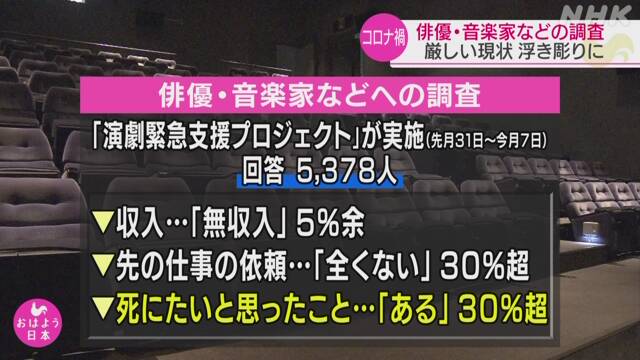
新型コロナウイルスの影響について文化関連の団体が俳優や音楽家などを対象にアンケート調査を行ったところ「コロナ禍で死にたいと思ったことがあるか」という質問に対して3割以上が「ある」と回答するなど、厳しい現状が浮き彫りとなりました。
この調査は、文化関連の30以上の団体が参加する「演劇緊急支援プロジェクト」が先月31日から今月7日にかけてインターネットを通じて行い、俳優や音楽家など文化芸術活動に携わる5378人から回答が寄せられました。
この中で、自粛前と比べた収入について回答した人の5%余りにあたる286人が「無収入」と答えたほか、さきざきの新しい仕事の依頼があるかという質問には、1656人が「まったくない」と答え、回答した人の3割以上を占めました。
また、「コロナ禍で死にたいと思ったことはあるか」という質問に対しては3割を超える1725人が「ある」と回答し、厳しい現状が浮き彫りとなりました。
このほか、自由記述欄には「演劇をやることへの周囲からの差別的な考え方がつらい」「エンタメ業界の復活が難しくなり、文化的につまらない国になると思う」といった意見が記されていました。
この結果について、14日夜行われたオンラインの記者会見で、劇作家で演出家の瀬戸山美咲さんは「文化芸術は多くの人たちの心を支えているはずなのに不要不急なものと言われて支援も後回しになり、作り手たちの心が守られていないことを示す結果となったのではないか」と話していました。
演劇緊急支援プロジェクトは今回の結果を国に提出し、公的な支援の拡充などを要望しています。
https://www3.nhk.or.jp/news/html/20210115/k10012815241000.html
新型コロナ 持続化給付金・家賃支援給付金 きょう申請締め切り
2021年1月15日 6時06分 新型コロナウイルス
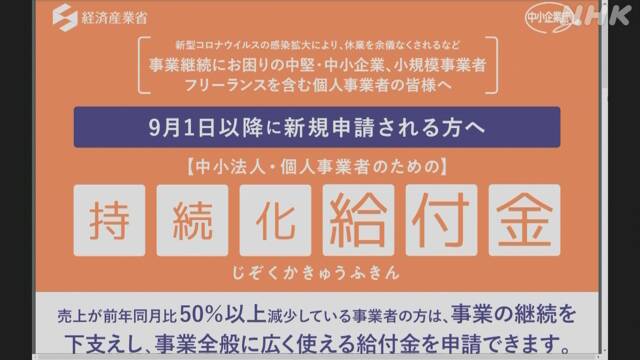
新型コロナウイルスの影響で売り上げが落ち込んだ中小企業などを支援する「持続化給付金」と「家賃支援給付金」は、書類の作成が間に合わないなど特別な事情がないかぎり15日で申請が締め切られ事業が終了します。
政府は、新型コロナウイルスの影響で売り上げが減少した中小企業に対して、最大200万円を支給する「持続化給付金」や、賃料の負担を軽減する「家賃支援給付金」を支給していますが、いずれも書類の作成が間に合わないなど特別な事情がないかぎり、15日で申請を締め切り事業を終了します。
経済産業省によりますと、13日の時点で「持続化給付金」は、およそ5兆3000億円、「家賃支援給付金」もおよそ7100億円が支給されたということです。
政府は、緊急事態宣言やそれに準じた措置が取られた地域で営業を短縮した飲食店の取引先や外出自粛の影響を受けた事業者に対して、売り上げの減少を条件に中堅・中小企業は最大40万円、個人事業主は最大20万円の一時金を支給する方針です。
持続化給付金では、迅速に支給するために手続きを簡素化した一方で、不正受給が全国で相次いだだけに適正な審査と迅速な支給を徹底できるかが課題となります。
https://www3.nhk.or.jp/news/html/20210115/k10012815221000.html
up-date:
Virus job losses highlight flawed system that gathers foreigners to Japan for ‘single-use’
January 18, 2021
quotes:
Munehiro Nakamichi, a judicial scrivener and head of Anti-Poverty Network Gunma, expressed a growing sense of crisis, saying, “The reality that those placed in vulnerable positions in society, such as elderly people, single mothers, and foreigners, are being driven into a corner has come to the fore amid the third wave of coronavirus infections.”
Masataka Nagasawa, head of the administrative office of Amigos, said that there have been an increasing number of cases where foreigners, who have been unable to pay their rent following the coronavirus outbreak, are seeking shelter at the homes of those from the same home countries. Nagasawa said, “We have been sending out soap, masks, medical thermometers, and other items as part of coronavirus countermeasures, but the number of households we shipped the equipment to fell from around 400 to around 300 by the beginning of December. I’m worried that the risk of infection has grown larger since a lot of people are living in a small room together.”
…
quote:
There are many cases where technical interns or foreign students seeking work come to Japan while shouldering a large amount of debt resulting from deals with malicious brokers in their home countries. Furthermore, there are endless cases of unpaid wages, as well as violence, sexual harassment, and other forms of abuse by employers in Japan.
“While the issue of poverty among foreign residents brought about by a system that treats technical interns and other migrant laborers as ‘single-use objects’ has been exposed, there have also been farms and fisheries that have ceased to function as new trainees have been unable to enter the country. It can be said that the coronavirus pandemic highlighted these two factors,” pointed out Ippei Torii, representative director of Solidarity Network with Migrants Japan, also known as Ijuren.
…
quote:
In 2019, the Japanese government implemented a set of new “skilled worker” visa statuses, in response to the voices of business circles that demanded that labor shortages be resolved. Although the government envisioned welcoming as many as some 40,000 people in the new system’s first fiscal year, the actual figure stood at just under one-tenth of that number. “What’s more, about 90% (of those who acquired the skilled worker visa) consisted of technical interns who switched their visa status. Even though the trainees are supposed to return to their home countries once training is over to transfer their skills, in reality, the training program has turned into a trial period preceding jobs as skilled workers,” added Torii.
He criticizes the Japanese government as having continued to make ad-hoc policies, such as a sudden shift to beefing up law enforcement control on individuals who overstay their visas, from the earlier policy of letting such cases slide. Other such policies include the expansion of nominal categories for visa statuses, such as ‘technical intern’ and ‘foreign student,’ while depending on the labor of such individuals, and the establishment of the new ‘skilled worker’ category, which failed badly before the pandemic. And all the while these foreign residents are, in fact, immigrants to Japan.
Furthermore, the current program is not consistent with the requests of employers in Japan. Torii said that as he has worked as an expert in the matter to talk with those who hire foreigners across the country, he was finding out that communities suffering from population declines and labor shortages wished for foreigners to migrate there on a full scale.
“A representative of an agricultural corporation told me that they’d like people who will ‘engage in fruit production in earnest’ to come work for them. There was also a member of a shipowner association from a different region who said that ‘fishing here would not hold up were it not for the trainees.’ I feel that there is a growing number of Japanese people engaging in their work diligently on the ground who have learned from experience that nationality is irrelevant in these cases,” revealed Torii.
Torii has pushed for the abolishment of the current technical intern training program, which leaves room for interference from malicious brokers, and calls for a system that treats incoming foreigners as “laborers,” and matches them with employers in the field via the local government-run “Hello Work” public employment security services.
He concluded by saying, “It’s impossible for individuals to come to Japan while already having the desired skillsets, and many employers in the field don’t have such expectations either. It’s natural for employers to judge whether workers are fit for the job while working with them, and it’s also natural for foreigners to wish to continue their jobs as they grow familiar with the workplace and become fond of the community. I’m sure that not everyone has the mindset that anything goes as long as the pay is good. The trainees come to Japan as people, not as a labor force that was transferred to the country. The current setup of the program does not consider the reality that it’s people who are working. I guess you can call it merely a deskbound discussion, or an armchair theory to be found online.”
https://mainichi.jp/english/articles/20210116/p2a/00m/0na/027000c
コロナ禍解雇、外国人困窮 「使い捨て」の本音あらわに 「実習制度見直す時」
会員限定有料記事 毎日新聞2021年1月13日 東京夕刊
社会全体を覆う新型コロナウイルスの感染拡大が、もともと生活に困窮していた人たちを直撃している。日本の社会で弱い立場に置かれている技能実習生ら外国人の暮らしは、瀬戸際に追い詰められつつある。
企業や官公庁などの仕事納めにあたる2020年12月28日、群馬県太田市では、生活に不安を抱える人たちを対象とした相談会が開かれていた。同県内の法律専門家や福祉関係者らでつくる「反貧困ネットワークぐんま」と、外国人の医療・生活支援を行ってきたNPO法人「北関東医療相談会(アミーゴス)」の共催で、日本人だけでなく外国人住民も朝から会場に足を運んでいた。
定住ビザを持つ60代のフィリピン人女性は、同県内の工場での仕事を同年3月に打ち切られた。持病を抱える30代の長男と2人暮らしだが、「今の経済状況では息子を病院に連れて行くこともできない」と首を振る。
more at:
https://mainichi.jp/articles/20210113/dde/012/040/021000c
コロナ感染、自宅療養中の女性が自殺 「家族にうつしたかも」悩む
毎日新聞2021年1月22日 10時21分(最終更新 1月22日 11時59分)
新型コロナウイルスに感染し、東京都内の自宅で療養していた30代女性が今月15日、自殺しているのが見つかった。関係者への取材で明らかになった。
女性は夫と娘との3人暮らしで、夫も娘も感染していたといい、「自分が娘にうつしたのではないか」と悩んでいたという。
「心のケア、改善策を検討」小池都知事
小池百合子東京都知事は22日午前、報道陣の取材に「本当に残念な出来事であり、コロナに感染された方の心のケアも必要だと強く感じた。そういったことが起こらないよう、どのような改善策があるのか、よく検討していきたい」と語った。【竹内麻子】
自殺対策に取り組むNPO法人「東京メンタルヘルス・スクエア」の武藤清栄理事長の話
SNSで相談を受けているが、新型コロナに感染してしまった悩みを相談してくる人は多い。感染者は外部に悩みを打ち明けられず、孤立してしまい、自責の念が強くなる。そうなると、自殺企図が起きてしまう。身近な家族などが声掛けすることが大事だし、感染した人も、家族や友人、働いている人は職場の産業医などと話をしてみることが大事。独りで思い詰めないでほしい。
◆相談窓口
いのちの電話相談
0570-783-556=ナビダイヤル 午前10時から午後10時まで
自殺予防「いのちの電話」
0120-783-556(なやみこころ)=毎月10日(午前8時から~11日午前8時)にフリーダイヤルの電話相談
日本いのちの電話連盟はこちら(http://www.inochinodenwa.org/)
全国のいのちの電話はこちら(http://www.inochinodenwa.org/lifeline.php)
東京自殺防止センター(NPO法人国際ビフレンダーズ東京自殺防止センター)
03-5286-9090=年中無休、午後8時~午前5時半(毎週火曜日は午後5時~午前2時半、毎週木曜日は午後8時~午前2時半
http://www.befrienders-jpn.org/
https://mainichi.jp/articles/20210122/k00/00m/040/032000c
Mom recovering from coronavirus in Tokyo kills self over worries about spread to family
January 22, 2021 (Mainichi Japan)
TOKYO — A woman in her 30s who was recuperating at home in the capital with a coronavirus infection was found to have killed herself on Jan. 15, according to individuals connected with the case.
The woman lived with her husband and daughter, and it was reported that both of them had also been infected. She was said to have been distressed at the thought she may have passed on the virus to her daughter.
***
— List of suicide prevention hotlines
TELL Lifeline (English):
https://telljp.com/lifeline/
Telephone hotline: 03-5774-0992 (9 a.m.-11 p.m. daily)
Online chat:
https://telljp.com/lifeline/tell-chat/
(Fri.-Sun., 10:30 p.m.-2 a.m.)
Counseling inquiries: 03-4550-1146 (Mon.-Fri., 10 a.m.-3 p.m.)
***
Federation of Inochi no Denwa (literally “telephone of life”) can be reached by phone at 0570-783-556 from 10 a.m. to 10 p.m.
Federation Inochi no Denwa also accepts toll-free phone consultations on the 10th of every month from 8 a.m. until 8 a.m. the following day at 0120-783-556
The Federation’s website is here:
http://www.inochinodenwa.org/
A list of hotlines by regions affiliated with the center can be found here: http://www.inochinodenwa.org/lifeline.php
***
The Tokyo suicide prevention center, a member of the nonprofit organization Befrienders Worldwide, can be reached every day from 8 p.m. to 5:30 a.m. (from 5 p.m. to 2:30 a.m. on Tuesdays and from 8 p.m. to 2:30 a.m. on Thursdays) at 03-5286-9090, or at
http://www.befrienders-jpn.org/
https://mainichi.jp/english/articles/20210122/p2a/00m/0na/004000c
「自分のせいで周りに迷惑」 コロナ感染 自宅療養の女性が自殺
NHK 2021年1月22日 12時39分
新型コロナウイルスに感染したあと自宅で療養していた東京都内の30代の女性が自殺していたことが分かりました。残されていたメモには「自分のせいで迷惑をかけてしまった」などと書かれていたということです。
専門家は「自宅療養者は特に精神的な負担が大きいケースがあり十分なケアが必要だ」と指摘しています。
関係者によりますと今月、東京都内のマンションの部屋で30代の女性が死亡しているのが見つかりました。
女性は、新型コロナウイルスに感染したことが分かったあと自宅で療養していたということで、現場の状況からみずから命を絶ったことが分かりました。
残されていたメモには「自分のせいで周りに迷惑をかけてしまい申し訳ない」という内容が書かれていたということです。
女性は症状はほとんどありませんでしたが、周囲の人が感染したことについて「自分がうつしたかもしれない」などと悩んでいたということです。
関係機関が当時の詳しいいきさつなどについて調べています。
小池都知事「どのような改善策あるのか検討したい」
新型コロナウイルスに感染したあと、自宅で療養していた東京都内の女性が自殺していたことについて、小池知事は記者団に対し、「本当に残念な出来事だ。感染された方が健康だけでなく心のケアを求めておられる、もしくは必要であるということを強く感じた」と述べました。
そのうえで、「どのような形だったのか確認し、またそういったことが起こらないように、どのような改善策があるのかよく検討していきたい」と述べました。
専門家「精神状態を把握しケアを」

新型コロナウイルスの感染拡大による精神面への影響などについて調べている早稲田大学の上田路子准教授は、自宅療養者が増える中、対策が必要だと指摘しています。
上田准教授は「新型コロナウイルスに感染すると健康面への不安だけでなく、『自分が家族にうつしてしまうかもしれない』といった不安や『社会からバッシングを受けるのではないか』というさまざまな精神的な負担を感じるという人が多い。特に自宅療養者は自分の健康の心配をしながら家事などをしなければならないこともあり、さらに外部の人との交流も制限されるので精神的にかなり追い詰められているのではないか」と指摘しています。
そして「保健所などによる体調面のチェックだけではなく精神状態についてももっときめ細かく把握し必要に応じて対応をとるなど十分なケアが必要だ」と話しています。
厚生労働省は、相談窓口を検索できるサイトも設けています。
URLは「http://shienjoho.go.jp/」で、電話のほか、メールやSNS、ファックスなどでも相談を受け付けているということです。
一部の窓口では相談の急増で電話を受けられなかったり、メールやSNSのメッセージにすぐに返信できなかったりするケースも出ています。
このため、厚生労働省は「つながらない場合は、ほかの窓口も探して、どうか相談先を見つけてほしい」としています。
https://www3.nhk.or.jp/news/html/20210122/k10012827321000.html
Suicides end 10-year decline in Japan as pandemic stress hits women harder
January 22, 2021
Suicides increased in Japan during 2020 after a decade of declines, with the number of women committing suicide surging amid the emotional and financial stress caused by the coronavirus pandemic even as fewer men took their own lives. Suicide has a long history in Japan as a way of avoiding shame or dishonor, and its suicide rate has long topped the Group of Seven nations, but a concerted national effort brought numbers down by roughly 40 percent over 15 years that included ten straight years of decline from 2009.
But preliminary police data published on Friday showed suicides totaled 20,919 last year, 750 more than in 2019.
The suicide rate had been trending lower in the first half of 2020, but from July onward the numbers began to rise as the impact of the coronavirus outbreak hit home, activists and researchers say.
By gender, 13,943 men and 6,976 women took their lives–a 1 percent decline on the previous year for men but a 14.5 percent increase for women, who tend to work in service and retail sectors that suffered more job losses during the pandemic.
“The painful trend of rising suicides by women has continued,” a Health Ministry official told a news briefing.
“Suicides are the result of many different things, but I think one thing we can definitely say is that there was an impact from the coronavirus on economic and lifestyle factors,” he added.
The worst month was October, when suicides totaled 2,153 for the highest monthly total in over five years. The number of suicides by women, at 851, rose 82.6 percent on the same month in 2019.
For many years in Japan, getting psychological help has been stigmatized, but when suicides hit a peak of 34,427 in 2003, alarmed policymakers drew up a comprehensive prevention program launched in 2007.
Through a combination of government and corporate efforts that included identifying at-risk groups, capping overtime and making it easier to get counselling, suicides had decreased to just over 20,000 in 2019, before the coronavirus struck.
http://www.asahi.com/ajw/articles/14127450
娘にだけは知られたくない…
2021年1月22日
コロナ禍で仕事がなくなり所持金も底をつきどうしていいかわからない。支援団体に助けを求める人たちは自分がまさかここまで追い込まれるとは思ってもみなかったと言います。そして「生活保護だけは受けたくない」。この取材を通して最も多く聞いたことばです。見えてきたのは壁となっている、行政が行うある手続きの存在でした。
…
数か月後には仕事は1か月に1度あるかという状態になったといいます。
国が当面の生活費を貸し出す緊急小口資金の20万円や取り崩した貯金も、先月、ほとんどなくなりました。
男性は東京都の窓口に相談しました。
そしてことし3月までは東京都が住まいを失った人を支援するために一時的な宿泊場所として用意したビジネスホテルに滞在できることになりました。
しかし、現在も仕事の見通しはたっていないといいます。
年が明けた1月4日、男性を訪ねると、残金は722円。
自治体の担当者からは生活保護の申請をするよう話がありましたが、断ったといいます。
男性は政治や制度の問題をあげて、生活保護を申請しない理由を1時間以上、話し続けました。
そして、取材の終わりにスマートフォンに保存された1枚の写真を見せてくれました。
男性のやわらかい表情を初めて見たという気がしました。
そこには離れて暮らす娘の晴れ姿が写っていました。
生活保護を申請すると、行政から親族に直接連絡する「扶養照会」が行われる場合があります。
男性は、親として、娘への扶養照会だけはなんとしても避けたいんですと、スマートフォンを見つめながら言いました。
「やっぱり娘にだけは今の状況を知られたくないし不安がらせたくないし、悲しませたくない。実はね、生活保護を受けない最大の理由なんです。娘と再会するときは自分の生活基盤をつくってそういう姿を見せられる自分になったときに1日も早く会いたい。それが今、生きている目的です」
男性は当面、国から生活費を借りることができる制度を利用することにしています。
「扶養照会」とは
「扶養照会」は、生活保護の申請を受けた自治体が申請した人に親族の経済的な状況などを聞き、援助を受けられる可能性があると判断した場合に、直接、親族に通知して問い合わせることです。
厚生労働省によりますと生活保護法には、民法で定められた3親等内の「扶養義務」の方が優先されるという条文があるため、行われているといいます。
厚生労働省は、▽配偶者からDVや虐待を受けていた▽20年以上にわたって連絡をとっていない▽親族がおおむね70歳以上などの場合は扶養照会をしなくてもよいと自治体に通知しています。
厚生労働省の担当者に扶養照会の必要性について聞くと「生活が困難になった人は自分でできることは全て行い、それでも自立が難しい場合に初めて生活保護を適用するという原則があり、これは法律の根幹にかかわる部分になります」と話していました。
厚生労働省はホームページ上で、「生活保護の申請は国民の権利です。生活保護を必要とする可能性はどなたにもあるものですので、ためらわずにご相談してください」とメッセージを発信しています。
「扶養照会」はどのように受け止められているのか。
年末年始に都内で炊き出しや相談支援にあたった、「つくろい東京ファンド」では相談を寄せた人にアンケート調査を行い165人から回答がありました。
団体によりますと、相談を寄せた人の多くが生活に困窮している状態にあったといいます。
しかし、生活保護を受けているのは37人(22.4%)で、106人(64.2%)は生活保護を1度も利用したことがありませんでした。

現在、生活保護を受けていない128人のうち、44人(34.4%)が「家族に知られるのが嫌だ」と回答しました。
団体では扶養照会の運用を最小限にとどめるべきだとして今月からインターネットで署名を集める活動を始めました。
2月に厚生労働省に集まった署名と要請書を提出することにしています。
つくろい東京ファンド 稲葉剛さん
「支援が尽きるタイミングである年末年始に、限界を超えているのに、生活保護だけは嫌だと言って福祉につながらない人が多くいました。特に『扶養照会』が大きな壁になっていて、自治体の中には『申請したら家族に連絡させてもらう』と言って諦めさせようとするところも一部にある。扶養照会は前時代的で、今やほとんど効力がなく、仕組み自体を無くすべきだと思いますが、コロナ禍で困窮者が増える中、ことは一刻を争います。まずは、申請者が事前に承諾し、明らかに扶養が期待される場合のみに限るべきです」
生活保護を受けると恥ずかしいと思っているため行政に相談できず、生活がギリギリになっている人もいます。
この40代の男性は長野県から上京して20年あまり、派遣やアルバイトの非正規雇用で働き続けてきました。
しかし、新型コロナウイルスの影響で去年の春以降、ほとんど仕事がなくなってしまったといいます。
…
炊き出しと砂糖で食いつなぐ
男性は生活保護を受けたくないと考え、去年3月から東京・池袋の支援団体が毎週土曜日に行っている炊き出しに通い続けてきました。
去年6月から、国の教育訓練でパソコンの実習を受け給付された40万円と、特別定額給付金の10万円、あわせて50万円を得ることができました。
再就職の活動をして10社ほど面接などの申し込みをしましたが採用されず貯金を取り崩して生活してきました。
…
「生活保護」申請を決断、しかし…
男性はこれまで炊き出しを訪れても、支援団体に相談をしたことはありませんでしたが先月31日の食料の提供の際に支援団体のスタッフに声をかけられました。
そして生活保護の申請を勧められました。
男性は「親に知られたくない」と断ろうとしましたが、扶養照会をされない場合もあると説得され、支援団体のスタッフと一緒に区役所の窓口に相談に行きました。

区役所担当者
「貯金はありますか?」
40代の男性
「来月の家賃5万円を払ったら、底を尽きます」
区役所担当者
「親の年齢は?」
40代の男性
「80代ですが…連絡は取りたくないです」
区役所担当者
「80代で年金生活なら、扶養はできないから連絡することはないので安心して下さい」
それなら…と、生活保護を申請をすることを決めました。
「やはり扶養照会する」と区役所から連絡
しかし、その1週間後、記者に「生活保護は諦めました」とメールがありました。
「やはり、兄弟など、別の親族に扶養照会することになる」と区役所から連絡があったため、申請をやめることにしたといいます。
男性は「家賃のために、1月は2万円しか使えないんですよ」と言っていました。
後日、送られてきた年賀状には「なんとか、ホームレスにはならないようにします」と丁寧な字で書かれていました。
コロナ禍で「生活保護」めぐる課題が顕在化
今回、取材をした支援団体の担当者は「コロナ禍で社会に埋もれていた貧困の問題が顕在化している」と話していました。
生活保護をめぐる課題についてはこれまでも指摘されてきましたが、取材を続ける中で本当に支援が必要な人に届かない実態について今こそ、改めて議論すべきではないかと強く感じました。
私たちは今後もみなさんの声をもとに取材を続けていきたいと思っています。
ご意見や情報提供をお待ちしています。
https://www3.nhk.or.jp/news/html/20210122/k10012827591000.html
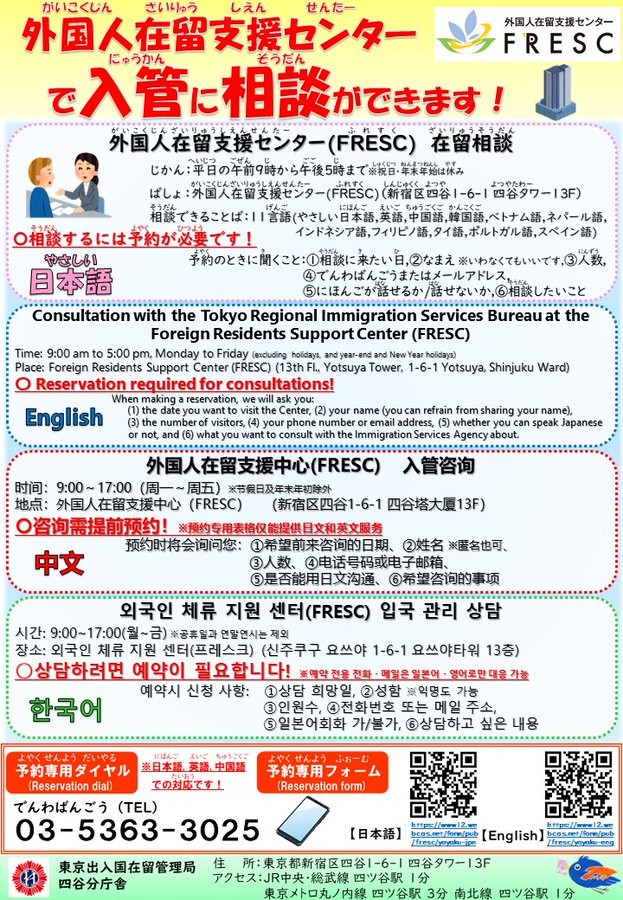
link_to_https://twitter.com/IMMI_TOKYO
東京出入国在留管理局
@IMMI_TOKYO
東京出入国在留管理局の公式アカウントです。皆さまのお役に立つ情報を発信していきます。 当アカウントに対するリプライ、リツイート等に対して個別の対応はいたしません。当局に対する御意見等につきましては、以下の宛先で承っております。 info-tokyo@i.moj.go.jp
http://moj.go.jp/mail.html
FRESCで入管(にゅうかん)に相談(そうだん)ができます!
Feel free to consult with Tokyo Immigration at FRESC!
随时都可以与FRESC入管咨询!
부담없이 FRESC의 입국 관리 상담를 이용해주십시오!
Link_to_https://twitter.com/IMMI_TOKYO/status/1353492216803598336
東京都 多摩地域5ホテル 1日500円でテレワーク利用可能に
2021年1月25日
東京都は、緊急事態宣言の下でテレワークを推進するため、多摩地域の5つのホテルの部屋をサテライトオフィスとして1日500円で利用してもらう事業をはじめました。
新型コロナウイルスの感染拡大による緊急事態宣言を受けて、東京都は、人の流れを抑制するため、出勤する人の7割削減を呼びかけています。
このためテレワークのより一層の推進を掲げていて、今月20日からは、多摩地域の5つのホテルに合わせて100室を確保してサテライトオフィスとして利用してもらう事業を始めました。
個人事業主を含め、都内に住むか都内で働いている人が対象で、利用料は1日1室500円です。
前日までにそれぞれのホテルへの予約が必要で、利用時間は午前9時から午後7時までです。
都では、事業者がテレワークを目的に宿泊施設の部屋を借り上げた場合1日1室当たり3000円を補助する事業も行っていて、これらの事業の積極的な利用を呼びかけています。
https://www3.nhk.or.jp/news/html/20210125/k10012831631000.html
Non-regular worker’s sudden plunge into poverty exposes Japan’s toxic labor environment
January 28, 2021 (Mainichi Japan)
quote:
Unemployment benefits can begin being paid a week after applying for them in the event that the termination of employment is cited as being at the employer’s request. But when the employee is described as the instigator, payments don’t begin until roughly two months later.
…
quote:
Until now, the Ministry of Health, Labor and Welfare limited who could receive loans based on their income, but in a bid to offer a more flexible response amid the coronavirus crisis, the system was expanded. When introducing the system the ministry said, “Starting with non-permanent workers and individual self-employed people, we’re improving the safety net for people in hardship.” As a person who has lost her job, the woman should definitely have been eligible for acceptance under the system.
In this image unrelated to the events described in the article, a consultation desk for people wishing to apply for emergency small fund public loans is seen at the Mito City Council of Social Welfare building in Mito, Ibaraki Prefecture. The Ministry of Health, Labor and Welfare has expanded the scheme to help people struggling due to the coronavirus, and many people have come forward to receive the aid. (Mainichi)
When she went to the ward office, the seats in the waiting area were almost all full, and after about 20 minutes she got a chance to talk to someone. But she only got the chance to speak with an employee at the consultation desk for five minutes. Even though she told them, “There were staff cuts at the place I was working,” they told her, “We don’t 100% know if it was a result of the coronavirus.”
Then, when she told them she would be receiving part-time pay in two weeks’ time, the government employee turned her case down, saying, “So you’re already working aren’t you. If it’s just two weeks from now, please do something about it yourself. There are people who’ve got it worse than you.” When she tried to explain somehow, another employee approached them and said, “What more do you have to say? Next person, please,” and hurried her to vacate her seat.
Following the exchange, she felt she wasn’t eligible for help, and her motivation to try and look for other support schemes was fading. From the consultation booth next to her, she heard a man saying, “They might turn me out of my house.” She told herself there were people in worse circumstances than her, and left the ward office.
“If I were a university student, I’d be able to say, ‘I’ve got no money, can you get me something?’ but becoming poor at this age is just embarrassing,” she said. She felt unable to reveal to people around her that she was in real trouble. To save on living expenses, she would turn down invitations from friends to meet for coffee. Rather than saying, “I’ve not got the money,” she’d use excuses like, “I’m busy,” or, “I’ve got work to do.”
“They’re my friends so I can’t talk to them about it,” she said. “They might be stunned if I started talking about serious things, and my story might spread like a weird rumor, like, ‘She went to an adult canteen. What’s wrong with her?'”
The woman did worry about losing her friends. She described going on Facebook and Twitter and seeing “happy pictures in posts from friends living at the family home, or who have families of their own. Just looking at them made me feel tired.”
…
quote:
“I don’t want to tell my close friends and family about me. If it’s a case of asking for help from my aging parents, then I want to try and solve it myself.” She hasn’t considered applying for public assistance welfare, either. “If I applied, and for some reason they contacted my family, I’d be verbally attacked by my father. I never want that to happen. Not having money is my personal responsibility.”
…
quote:
“I also hear from people saying they were treated coldly at their local government office, but those public employees are also completely overworked, and working conditions at these services are on the verge of falling apart. Government offices could hire people who have lost their jobs. If they respond to the issues by increasing personnel numbers in places where they’re needed, I think they’ll be able to fully rescue them (people in hardship).”
Amamiya and other activists are encouraging people under difficulties to use public assistance. She also said that support group members are going with people to submit applications for the benefits, and that they’re also in negotiations to make it so that inquiries don’t have to be made with people’s dependents.
She concluded: “Public welfare is help you can use if you have no savings or assets, and your income doesn’t meet the lowest acceptable levels described by the national government (which in Tokyo’s 23 special wards is an individual income of about 130,000 yen — about $1,254 — per month). I want anyone with an income below this amount to speak to someone about getting aid as soon as they can.”
full text:
https://mainichi.jp/english/articles/20210128/p2a/00m/0na/043000c
気づいたら全財産103円 42歳女性が「見えない貧困」に落ちるまで
会員限定有料記事 毎日新聞2021年1月23日 13時00分(最終更新 1月28日 12時12分)
「気がつくと、所持金は103円でした。4日の仕事始めに出勤する電車賃もなくなっていました」。短大卒業後、非正規雇用で働いてきた女性(42)は突然、自分とは関係ないと思っていた「リアルな貧困」に直面した。給料が安くても仕事を絶やさずにやってきた。でも40代になるとバイトの面接にすらなかなか呼ばれなくなってしまった。家賃の引き落とし日が迫るのが怖くて仕方がなくなった。「真面目に生きていきたいだけです。どうしてこんなことになったのでしょう?」。女性に声をかけると、こう聞き返してきた。【木許はるみ/統合デジタル取材センター】
夕暮れ時、人影が少なくなった会場を出ようとした女性が支援スタッフの男性から声をかけられていた。「野菜もあるよ、あ、ガスが止まってるんだったね」。女性ははきはきした声でお礼を伝えていた。記者と同世代に見えた。1月3日、東京都千代田区の聖イグナチオ教会で開催された「年越し大人食堂」の取材で、女性に声をかけてみた。
「これ見てください。笑いますよね」。女性はショルダーバッグから長財布を取り出した。小銭入れを開けて、100円玉と1円3枚をジャラジャラと揺らしてみせた。…
https://mainichi.jp/articles/20210122/k00/00m/040/380000c
Japan PM to people impoverished by coronavirus crisis: In the end, turn to welfare
January 28, 2021 (Mainichi Japan)
TOKYO — The Japanese government ultimately has no plans to support people pushed into poverty by the impact of the coronavirus pandemic beyond the welfare system, Prime Minister Yoshihide Suga suggested to lawmakers on Jan. 27.
The Suga administration has come under fire for insufficient assistance for people who have been laid off, restaurants and other businesses, and workers suffering from severe income drops due to requests for shorter business hours due to the coronavirus crisis.
Suga’s comment came after Michihiro Ishibashi, of the largest opposition Constitutional Democratic Party of Japan (CDP), asked the prime minister during a House of Councillors Budget Committee session, “Are you telling people in dire economic straits (due to the pandemic) to just help themselves?”
Suga replied that he wanted to aim for a society of “self-help, mutual cooperation, public assistance, and community bonds.” He added, “First of all, (people) should try whatever they can on their own. If that does not work at all, then the government will step in to help with the social safety net. That is the kind of trusted government I would like.”
Ishibashi then asked, “There are more and more people now taking their own lives because they’ve lost their livelihoods. Is it (support) really reaching people in need?”
Suga stated, “There are various measures in place and, in the end, the government has the welfare system.”
Later, CDP lawmaker Renho stood up and said, “That (the prime minister’s) answer was beyond the pale.” She then asked, “Is it not the job of the prime minister, and politics, to work to prevent people from falling into welfare?”
Suga responded, “In the end there’s the safety net. And what I said was that I want to create a trust-based society.”
https://mainichi.jp/english/articles/20210128/p2a/00m/0na/012000c
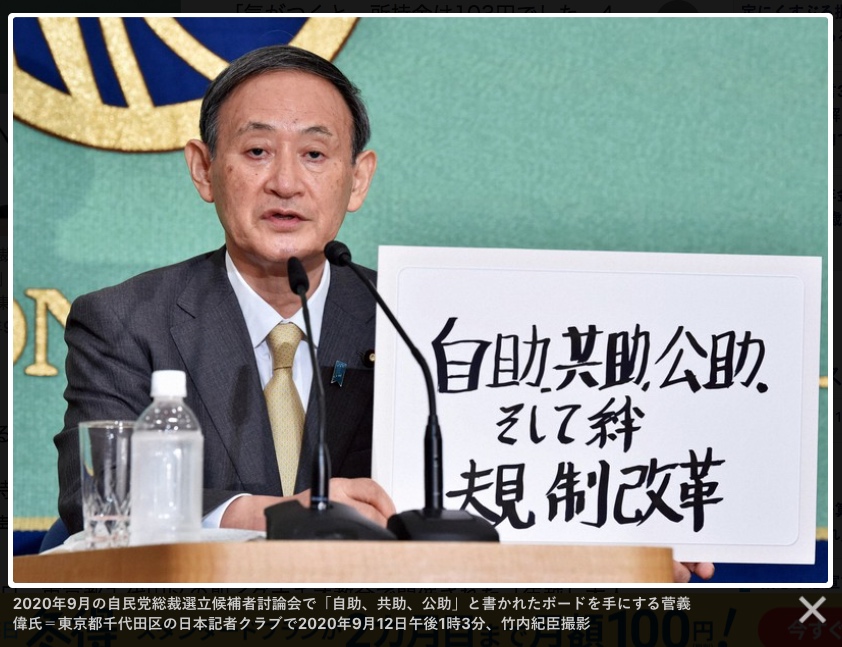
菅首相「最終的には生活保護」 新型コロナでの困窮者支援で持論、野党から批判
毎日新聞2021年1月27日 19時10分(最終更新 1月28日 06時34分)
菅義偉首相は27日の参院予算委員会で、新型コロナウイルス感染拡大の影響で生活に困窮する人たちへの支援について「最終的には生活保護」と答弁した。失業者や飲食店の時短要請に伴う減収などに対する支援が不十分との指摘がある中で、唐突に生活保護に言及したことに、野党から批判が出ている。
立憲民主党の石橋通宏氏が「(コロナ下で)弱い立場にある人にも『自助』をと言うのか」とただすと、首相は「自助、共助、公助そして絆」という社会像を目指したいと強調。そのうえで「まずは自分でできることはやってみる。どうにもならないときは、政府がセーフティーネットで助けてくれる。そういう信頼される政府を目指したい」と持論を展開した。
石橋氏が「収入を失って命を落とす人が多数に上っている。(支援の)政策は届いているのか」と迫ると、首相は「いろいろな対応策もあるし、政府には最終的には生活保護という仕組みも(ある)」と述べた。「最終的には」としつつも突然、生活保護による支援に触れた。
その後、質問に立った立憲の蓮舫氏は、この発言について「この答弁はあんまりだ。生活保護に陥らせないためにするのが首相の仕事で、政治ではないか」と批判。首相は「最後はセーフティーネットもあり、信頼する社会をつくっていきたいという話をした」と釈明した。【竹地広憲】
https://mainichi.jp/articles/20210127/k00/00m/040/205000c
up-date 2021/2/23
120,000-plus households received housing support in Japan amid COVID-19 pandemic
February 22, 2021
TOKYO — At least 125,874 households in Japan received housing support over the nine months up to December 2020 as the prolonged coronavirus pandemic took a heavy toll on people’s livelihoods, a Mainichi Shimbun survey has found.
The households received assistance ranging from benefits for securing housing and the temporary provision of public housing, to rent reductions and exemptions. In 15 of the local governments covered by the survey, the number of allowance payments shot up to a level more than 40 times that of the previous fiscal year. Among them were Oita and Shimane prefectures in western Japan, indicating that not only urban areas but also local regions have been suffering from the pandemic’s impact.
The Mainichi Shimbun queried the Ministry of Health, Labor and Welfare, 47 prefectural governments and 20 ordinance-designated cities about the status of their housing-related assistance implemented between April 2020 — when Japan’s first state of emergency over the coronavirus was called — and December that year. As a large number of people have lost jobs or seen a decline in income due to the economic downturn triggered by the spread of COVID-19 infections, local authorities have been providing housing support to affected residents.
The pillar of such assistance is benefits for securing housing, in which the national and local governments shoulder a certain portion of rent. Payments of such benefits were approved in 119,265 cases during the period, according to preliminary figures — some 30 times the 3,972 cases recorded in fiscal 2019.
Meanwhile, 5,412 households living in public housing were granted rent reductions or exemptions, or payment deferral, among other assistance. Another 611 households temporarily moved into publicly run housing. In addition, A total of 586 households were allowed to live temporarily in privately rented housing — a measure implemented by some local governments.
Among local bodies where the number of such cases can be compared against fiscal 2019, the city of Osaka saw the figure rise 113 times to 6,547 cases, while in Kyoto, the number climbed 74 times to 2,883 cases.
In 2020, the number of applications filed for benefits for securing housing peaked in May and June, and approval of those applications peaked between May and July. However, even in December, 25 local bodies including Hokkaido, Tokyo and the city of Fukuoka saw a higher number of housing benefit payments in that month alone than during the whole of fiscal 2019. Overall, there were 4,351 cases where such payments were approved across the country in December.
The spike in the number of payments is also partly attributable to the health ministry’s inclusion of people who lost income due to business closures and other circumstances amid the spread of the virus as being eligible for the aid. In 17 localities that were aware of the backgrounds of the applications, more than 60% of the applications were filed due to business closures and other such reasons.
Housing benefits were established in Japan in the wake of the global financial crisis triggered by the collapse of Lehman Brothers in 2008, in accordance with a law to support the self-reliance of those in need. While beneficiaries do not need to move into new housing, the period of assistance was fixed at three months in principle, with the maximum period set at nine months. For households that began receiving the benefits in April last year, the expiration date was the end of December, but the support period was extended to a maximum of one year shortly before the aid was due to expire. Even though extensions have been granted, the allowance is not designed for long-term use.
“If the benefits expire, there could be a steep rise in the number of applicants who want to move into public housing,” said a representative of the Tochigi Prefectural Government.
2021/2/20
コロナ下、住宅支援12.5万件 昨年、15自治体で40倍超 都道府県・政令市
新型コロナウイルスの影響が長引く中、2020年12月までの9カ月間に、全国で少なくとも12万5874世帯が住居確保給付金、公営住宅の一時提供、家賃減免などの住居に関する支援を受けた。15の自治体では給付金の支給件数が前年度1年分の40倍以上に急増。その中には大分、島根県も含まれ、都市圏に限らず地方も厳しい状況となっている。
毎日新聞が厚生労働省と47都道府県・20政令市の自治体に対して、1回目の緊急事態宣言が出た20年4月から12月までの間に実施した住居に関する支援状況を尋ねた。感染拡大の影響で経済が低迷し、職を失ったり収入が減ったりした人が相次ぎ、自治体は住居支援を行っている。
2021/3/22
‘1 cup of noodles per day’: COVID-19 aggravates poverty among isolated young in Japan
March 22, 2021
TOKYO — Many young adults including those who moved out of foster care facilities in Japan have been isolated and pushed to the edge amid the coronavirus pandemic, with cries of help heard from people who can only afford one cup of instant noodles per day, or those who have to scrape by on a monthly salary below 30,000 yen (roughly $275).
•
While many such youths have few people they can rely on or turn to, and are financially struggling, the pandemic is taking its toll on nonregular and part-time workers who have unstable employment conditions, and is also making it difficult to make interpersonal connections. Private bodies and other parties have set out to support those in need through donations, among other efforts.
“I’m cutting down on my food costs, and I only have a cup of instant noodles every day,” and, “My February salary fell short of 30,000 yen. My father has passed away, and as I’m estranged from my mother, I don’t receive any allowances” is an example of the numerous cries for help sent in to Masterpiece — a general incorporated association based in Chiba, east of Tokyo, that supports youths who become independent after leaving foster care facilities, foster homes assisting individuals to become self-reliant, and foster families. Many such individuals apparently seek food provisions along with living expenses.
A 19-year-old woman living in Tokyo was admitted into a foster care facility when she was in her second year of high school. She was apparently a victim of violence and other abuse from her mother, and was placed under protection. Although she began living with her father and younger brothers after graduating from high school in March last year, her father never pays her expenses for food or daily living.
In spite of this, the woman continues to work part time while also attending vocational school, and even looks after her younger siblings. Although she is far from financially secure, she said that she “was completely unaware of the existence” of the national government’s coronavirus relief handout of 100,000 yen (about $916) per person, which was distributed last spring. This is because payments for household members were made altogether to the head of each household, and so her father apparently received all of the handouts.
It is believed that there were many cases where young adults could not receive the benefits of the cash handout, like this woman, including individuals who lived alone while staying registered as a resident of their family’s home.
Furthermore, employment conditions were exacerbated under the second state of emergency in place since January this year, and her work shifts at the pharmacy decreased. As a result, her part-time pay fell from a monthly salary of around 60,000 yen (roughly $551) to about 30,000 yen — half the original amount.
She uses the money earned from her part-time job to cover her brothers’ and her own food, drink and pocket money, but she says that there are often days when they do not have enough money for proper meals.
The woman, who applied to Masterpiece to receive an allowance, said, “I had an unpleasant experience when I confided in a friend about my situation at home, so until now I found it hard to talk to those around me.”
A series of applications seeking support have been made to Masterpiece by youths who moved out of facilities or the homes of foster families. Marika Kikuchi, 33, head of the association, expressed fear over the current situation, and said, “Under the second state of emergency, there have been no temporary school closures or panic hoarding, and many people have had little consequences to their daily lives. On the other hand, the incomes of young people who work part-time or as irregular workers have only been on the decline, and some say ‘it’s even worse than the last state of emergency.’ The plight of some people has become more hidden.”
Staff at Masterpiece, who have at least two years’ experience working or volunteering at foster care facilities, offer consultations on the phone to young people seeking support. The association not only provides allowances, food support and information, but also “values its role as a place for emotional support,” said Kikuchi.
According to the Ministry of Health, Labor and Welfare, there are about 27,000 children in foster care facilities across Japan who cannot live with guardians due to abuse and other reasons. Meanwhile, young people who leave such facilities at the age of 18 tend to become isolated as they barely have any adults they can rely on. There is also a large number of such individuals, both students and working adults, in financial difficulty.
Although Japan’s Child Welfare Act stipulates that facilities talk with those moving out and assist their transition to self-reliance, such support has been insufficient due to issues including a shortage in employees as well as funds. Therefore, the importance of aftercare for those who left facilities has been highlighted in recent years.
In addition, even if they want to receive general public support, it is apparently difficult for individuals to reach the point of filing an application, which requires tracking down information and comprehending the system. Some say quite a few people have become hesitant about visiting local governments due to receiving ill treatment at consultation windows after explaining their situation of not having anyone to rely on.
The Tokyo Voluntary Action Center (TVAC), run by the Tokyo Council of Social Welfare, conducted a survey between May and August 2020, as part of the Outreach Project, a support program in collaboration with major securities firm Goldman Sachs, and obtained responses from 1,851 people who moved out of foster care facilities.
The survey found almost half of respondents answering that their living conditions had worsened compared to before the coronavirus. In addition, 40% of those who said they were currently working, including students, claimed that their income had decreased due to the pandemic. While 28% of respondents — the largest group — reported a decrease of between 20% and 40%, those who claimed that their earnings dropped by over 60% accounted for 13%, and 49 individuals lost their jobs.
Those who live alone constituted 60% of all respondents, and the isolation of youths in society is another concern alongside poverty. In the free description section of the questionnaire, there were comments suggesting that these young adults were facing physical and mental anxiety over not having any relatives to rely on, and were pushed to the edge by financial distress and other factors.
The survey included comments such as:
“My monthly salary dropped to about under half. I sometimes become scared that I’ll end up dying like this.”
“I can’t get a job no matter how much I do interviews or apply to job postings. I’m just wasting my time. My money has hit rock bottom. I’ve lost the energy to take action to try to break through the current situation.”
“I’m making a living by getting more part-time jobs. It’s rough because I don’t get enough sleep, and I also need to save up on expenses for entrance exams, entrance fees and tuition, as I want to go back to school.”
Under the Outreach Project, employee transportation expenses at foster care facilities were subsidized so that they could offer continuous aftercare to those who moved out, and emergency handouts of up to 100,000 yen were distributed to individuals who left such facilities. As it is unclear when the coronavirus will be contained, the project administrators gave additional aid of up to 60,000 yen to facilities in January this year.
According to Mikiko Yamazaki, the head of TVAC, issues to be addressed surfaced in the questionnaire. She said, “The survey results showed that the take-home pay of over 80% of respondents didn’t reach 200,000 yen (approx. $1,837), even before the coronavirus. Young adults raised in facilities, who were barely getting by to begin with, are being driven further into a corner from a decrease in income and difficulties in building interpersonal relationships, brought on by the coronavirus.”
Yamazaki also mentioned that the center has only been able to support individuals who have been able to keep good relationships with facilities, and showed deep concern over a further spread of poverty. “There is the possibility that those who are not in touch with the facilities they were raised at have fallen into an even more troubled state,” she said.
The Japanese government will place aftercare specialists for supporting children’s transition to self-reliance at nationwide foster care facilities from the next fiscal year. Yamazaki said, “Rather than simply dispatching staff, I’d like the government to create a system that thoroughly covers various expenses, including transportation fees for staff visiting young adults who moved out of facilities, food and communications expenses used for consultations, costs of purchased supplies, operation-related expenses, and emergency handouts.”
The term “social care” is used in Japan, which expresses the doctrine that children who cannot depend on their parents should be raised by society as a whole. Yamazaki said, “We must gather the interest and support of many parties, including companies, local governments and private organizations, rather than just foster care facilities and the national government.”
https://mainichi.jp/english/articles/20210320/p2a/00m/0na/011000c
「1日1個のカップ麺生活」困窮の淵に立つ養護施設出身者の現実
新型コロナウイルスの感染拡大で、児童養護施設などを巣立った若者らの多くが、孤立と困窮の淵に追いやられている。頼れる人、相談できる人が乏しく、経済的にも苦しい若者が多いうえ、新型コロナが不安定な非正規雇用やアルバイトの仕事を直撃し、人とのつながりも作りにくくなった。「1日1個のカップ麺生活」という悲痛な声も聞かれ、民間団体などが寄付を募るなどして支援に乗り出している。【尾崎修二/東京地方部】
「食費を減らし、毎日1食カップ麺で生活している」
「2月の給与は3万円に届かない。父は他界し、母とも疎遠のため仕送りもない」
児童養護施設や自立援助ホーム、里親家庭などを巣立った若者をサポートする一般社団法人「Masterpiece(マスターピース)」(千葉)にはこんな切実な声が次々と届く。その多くが生活費とともに食料も求めているという。
国の10万円給付の存在も知らされず
東京都内に住む女性(19)は高校2年の時に児童養護施設に入った。母親から暴力を振るわれるなどの虐待を受け、保護されたという。昨年3月に高校を卒業した後は父親や弟たちと暮らしているが、父親は食費や生活費の工面をしてくれない。
それでも、専門学校に通いながらアルバイトを続け、弟たちの世話もしている。経済的な余裕はないが、昨春、政府が実施した1人あたり10万円の特別定額給付金も「存在自体まったく知らなかった」と話す。給付金は世帯主が一括で受け取る仕組みになっていたためで、父親が全額受け取ったらしい。
住民登録が実家のまま1人暮らしをしている若者を含め…
https://mainichi.jp/articles/20210303/k00/00m/040/315000c
update 2021/6
Overdue bills, no job: People in need of welfare get help from assembly members in Japan
June 4, 2021
TOKYO — Facing calls for the government to expand its economic support measures in the wake of the spread of the coronavirus, Prime Minister Yoshihide Suga stated in the Diet, “Ultimately, we have welfare.” However, the truth of the matter is that people can’t always immediately receive public assistance at their local government office.
•
Aware of the difficulties some people face, Shuhei Ogura, 47, an assemblyman of Tokyo’s Adachi Ward, has been helping those in need apply for welfare and rebuild their lives for more than a decade. His view is that “poverty is never your own fault.”
Since last spring, the number of times he accompanied people to the ward office to apply for public assistance has increased. Ogura has formed a group of like-minded local assembly members and is expanding his circle of support.
One of the people Ogura accompanied to the Adachi Ward Office who was able to receive public assistance was a woman in her early 30s. The woman is from the Shinetsu region and was living in a rented apartment in Chiba Prefecture, but lost her home when she became absorbed in her hobby and failed to pay her rent.
She was also unable to make calls on her smartphone due to overdue bills, but she didn’t give up her phone because she could use the free communication application LINE to contact her acquaintances in places where free Wi-Fi was available, such as around convenience stores.
For more than three years, she had worked at a “girls’ bar,” where staff are mainly women, in Tokyo, while sleeping at an internet cafe. However, due to the effects of the coronavirus pandemic, the bar’s business hours were shortened and her income was reduced to less than half. In August 2020, she “voluntarily resigned” because it became difficult for her to work there since the bar had to thoroughly check not only her age but her residence in case of infection.
Her savings quickly ran out, and she had to repeatedly borrow from moneylending firms and others. At the end of March this year, when she had only 1,000 yen (about $9) in her pocket and could no longer stay at an internet cafe, she sent an email to an organization that supports the needy, asking for help. She recalls, “I contacted them thinking, ‘If this doesn’t work, I might as well die.” It was Ogura who came to her rescue.
Ogura gave her the necessary cash that the support group had prepared as an emergency loan, and secured a place for her to stay. Later, she successfully received public assistance in Adachi Ward, obtained a new residence certificate, and found an apartment to live in.
The Mainichi Shimbun asked the woman what she would like to do when she is able to live in the apartment. The answer was, “I would like to cook, because internet cafes don’t have kitchens. I’ve been eating nothing but cup noodles and rice balls.” She had never been able to cook due to her circumstances, though she was good at it.
The woman, who can now stand in a kitchen again, expressed her gratitude to Ogura. “I couldn’t understand half of the explanations given at the ward office, and I think I would have given up on applying for public assistance on my own,” she said. “I want to rebuild my life from now on.”
When people apply for public assistance, the response of the welfare office, which is the contact point for the local government, is often a problem. In some cases, the welfare offices do not respond to the applications of the needy, forcing them to go to the local government office where their residence is registered or to look for a job. Among those working to support the needy, this tactic of welfare offices of turning applicants away at the door is known as a “shoreline operation.”
Accompanying people when they apply for public assistance is not only a way to prevent such “shoreline operations,” but can help them receive additional support to rebuild their lives afterwards, such as preparing a certificate of residence, finding an apartment, and receiving necessary public support.
The assemblyman pointed out that “essentially, anyone should be able to apply for public assistance smoothly on their own, without the need for someone to accompany them.” He added, “There are some cases where it is difficult to go through the procedures, which include reacquiring a certificate of residence. There is a need for someone to work with them and advise them on the procedures.”
Ogura began providing full-fledged support for people applying for public assistance around 2007, when he was in his first term as a member of the Adachi Ward Assembly. He says that he started this activity as a result of his night patrol activities to support people who were living in the streets when he was a student.
Ogura graduated from university in the 1990s, during Japan’s “employment ice age,” when young people had a hard time finding jobs due to the collapse of the “bubble” economy. Unable to find a full-time job, one time, Ogura became a temp worker, and another time, took a day job in Kamagasaki, Osaka, an area known for its day laborers. Seeing “old men,” who had no choice but to sleep in the open, working hard to make a living, he began to aspire to start a career in politics.
“I think the role of politics is to look at the reality of those who cannot speak up and act accordingly. We have to change the social system while solving the real problems,” Ogura said.
Local assembly members are the politicians with whom citizens are most familiar. However, there are various ways of thinking among them. Some go as far as considering welfare “a disgrace,” while others focus on supporting the needy. Ogura called on Kaoru Katayama, 54, a city assembly member of Koganei, Tokyo, and others to form the “association of local assembly members for coronavirus disaster countermeasures” in April last year.
Currently, the association has about 200 members, mainly in the Tokyo metropolitan area. Ogura said, “I think that assembly members who thought that their supporters had no connection with public assistance could no longer remain unconcerned as the coronavirus spread.”
Some members of the association apparently have little or no experience in accompanying people applying for public assistance. Ogura explained, “Applying for public assistance is a life-and-death issue for people in need,” and he has held two online study sessions for members to learn about the practical work and putting it in practice from local government caseworkers. He says he plans to continue learning about court cases and social conditions related to public assistance.
The Tokyo metropolitan area is not the only area with such a network of local assembly members. In April last year, Sachiyo Ikeda, 49, a member of the city assembly of Komagane, Nagano Prefecture, established a network of local government assembly members to help people in regional areas receive public assistance, naming the group “Local Safety Network.”
“In rural areas, people in need are isolated and neglected, and there are far fewer places where women, in particular, can go for advice or ask for support if they are in need of help with their livelihood or because of work problems,” Ikeda said.
The network currently has about 60 members, and its Facebook page plays a role in their activities. On the page Ikeda created under the name of the network, she posts the names and contact information of assembly members who have offered to lend a hand, so that those in need can consult them.
When one welfare recipient consulted with Ikeda about being forced to move out of her apartment and having no money, the lawyer and caseworker, who were old acquaintances of hers, researched past precedents and notices in detail, and eventually the recipient was able to move out safely after obtaining relocation expenses.
Ikeda also formed the “Nagano general labor union Kamiina branch,” a labor union that individuals can join, together with local assembly members who are active in the same area. The reason for this was that she learned that quite a few workers were left with no way to resolve problems such as non-payment of wages, layoffs, and not being allowed to claim worker’s compensation insurance.
Some people have questioned her activities, saying, “Is that the job of a municipal assembly member?” But Ikeda does not flinch, responding, “This is the job of a local assembly member. It is better for assembly members to get involved in local labor, daily life and legal consultations with the help of experts. From there, we can gain a real understanding of how local people live and work, and what issues need to be addressed.”
https://mainichi.jp/english/articles/20210603/p2a/00m/0na/017000c
生活保護で取り戻す平穏 地方議員伴走「貧困は自己責任じゃない」

女性(右)と今後の生活再建について打ち合わせる足立区議の小椋修平氏=東京都中野区で2021年4月19日、東海林智撮影
「最終的には生活保護」。そう語ったのは、日ごろから自助や共助を強調する菅義偉首相だ。でも、ネットカフェや屋外で寝泊まりする“ホームレス状態”を抜け出すのは簡単ではない。そもそも役所の窓口ですぐに生活保護を受けられるとも限らない。「貧困は決して自己責任なんかじゃない」という東京都足立区議の小椋修平さん(47)はこの十数年、困窮した人らに同行して役所で生活保護を申請したり、生活再建をサポートしたりしている。新型コロナウイルスの感染拡大に伴い、同じ志を持つ地方議員のグループをつくった。
地方議員、再建をサポート
4月中旬。足立区役所に、小椋さんと30代前半の女性の姿があった。住む場所を失って、足立区内のネットカフェで生活してきたという女性。すでに小椋さんの同行で生活保護の申請を済ませており、この日は戸籍住民課の窓口を訪ねた。緊張した面持ちで、千葉県内のある自治体の住所が記された住民票の写しを差し出した。ボロボロになった折り目の部分が、セロハンテープで補強されている。
その住所は女性がかつて住んでいた場所だ。小椋さんは慣れた口調で職員と話し始めた。ほどなく区職員が照会すると、住民票は女性の居住実態がないことを理由に、千葉の自治体によって消除されていた。「5年たっていなくて良かった」。小椋さんは安堵(あんど)した。住民票が消除されてから5年以上経過すると、新たな住民票を得るためには本籍地から戸籍抄本を取り寄せるなどの手続きが必要になるからだ。
実はこの間、女性はずっとこわ張った表情のままだった。何を話しているかすら分からなかったからだ。「祈るような気持ちだった」と女性。小椋さんが「大丈夫だったから」と声をかけると、ようやくほっとした表情を浮かべた。
住民票がなくても生活保護の申請はできる。でも、住民票は生活保護を受けるようになってからその自治体で住所を得たり、住民サービスを利用したりするためには欠かせない。「ここでつまずく人も多い」と小椋さんは説明する。
女性は信越地方の出身。千葉県内の賃貸アパートで暮らしていたが、趣味にのめり込んで家賃を滞納し住居を失った。持っていたスマートフォンも料金の滞納で通話できなくなった。
それでもスマホを手放さなかったのは、コンビニエンスストア周辺など、無料Wi-Fi(ワイファイ、無線LAN)が使える場所では、無料通信アプリ「LINE(ライン)」で知人と連絡が取…
more:
https://mainichi.jp/articles/20210525/k00/00m/040/339000c
Japan’s impoverished hesitating to apply for welfare due to checks on kin
February 8, 2021
TOKYO — A system in which authorities phone the parents, siblings or other kin of people applying for welfare in Japan to check whether they can offer financial assistance is placing a psychological burden on applicants that causes some to hesitate to apply for social aid, a survey conducted by a group supporting the needy has found.
Those familiar with the situation say that the system is hindering people from receiving livelihood protection payments, which are supposed to serve as their “final safety net.”
The survey was conducted by Tsukuroi Tokyo Fund, a group that provided meals to people in locations across Tokyo over the New Year period and consulted them about their livelihoods. The group received responses from 165 people. Around 90% of them were men, and their average age was 56.
In the survey, 32 of the 59 people who were receiving welfare or had done so in the past, or 54.2%, said they had a feeling of hesitation when it came to receiving assistance. When 128 people who were not receiving welfare were asked why, with multiple answers permitted, the top response was “Because I don’t want my family to know about it,” given by 44 people, or 34.4%. When asked what changes would prompt them to use the system, the top answer, given by 51 people, or 39.8%, was “If my relatives didn’t find out about it.”
As for the system to check with kin regarding support, the various responses included, “They’re in the countryside, so my relatives will also find out about it,” I don’t want my own daughter to see me like this,” and “I don’t want to shock my elderly parents,” hinting that the general pervading atmosphere was that receiving welfare was “shameful.”
Utilization of the person’s ability to work and their personal savings are conditions for their receipt of livelihood protection aid, but receiving support from relatives is not a condition. The Ministry of Health, Labor and Welfare has notified authorities that it is unnecessary to contact the perpetrators of domestic violence or those aged 70 or over when carrying out the assistance checks.
Tsuyoshi Inaba, representative director of Tsukuroi Tokyo Fund, called for authorities to stop using the checking system without the consent of the person seeking assistance.
“The biggest factor hindering use of livelihood protection aid is the checking system. It’s unnecessary and damaging, and I want it stopped,” he said.
https://mainichi.jp/english/articles/20210208/p2a/00m/0na/015000c
生活保護「家族に知られたくない」 扶養照会に抵抗感、受給の壁に
毎日新聞2021年2月8日 09時51
生活保護を申請した人の親やきょうだいなどの親族に連絡し、当事者を援助できるかどうかを尋ねる「扶養照会」が生活保護の申請をためらわせ、受給する際の心理的な負担になっている--。困窮者支援団体によるアンケートでこうした実態が明らかになった。関係者は、「扶養照会が『最後のセーフティーネット』と呼ばれる生活保護の利用を阻害している」として運用改善を求めている。【遠藤拓】
アンケートは年末年始に東京都内各地で催された当事者への食事提供や生活相談の場で、一般社団法人つくろい東京ファンド(稲葉剛代表理事)が実施した。回答者165人の9割超が男性で、平均年齢は56・0歳だった。
アンケートによると、生活保護を利用しているか過去に利用していた59人のうち、扶養照会に「抵抗感があった」と回答したのは32人(54・2%)だった。現在、生活保護を利用していない128人に理由を尋ねると(複数回答可)、「家族に知られるのが嫌だから」が最も多い44人(34・4%)。制度や運用がどう変わったら利用したいかを尋ねると(複数回答可)、「親族に知られることがないなら」が最多の51人(39・8%)だった。
回答者からは、扶養照会を巡り「田舎だから親戚にも知られてしまう」「今の姿を自分の娘に知られたくない」「年取った両親をビックリさせたくない」といった意見が寄せられ、生活保護を「恥」と捉える風潮の根強さをうかがわせる。
生活保護を受ける際は預貯金や働く能力を活用することが要件とされているが、親族の扶養を受けることは要件ではない。厚生労働省はDV(家庭内暴力)加害者や70歳以上の高齢者らへの扶養照会は不要とする通知を出している。
稲葉氏は「生活保護の利用を阻害している一番大きな要因は扶養照会だ。必要なく有害な扶養照会はやめてほしい」と指摘し、当事者の承諾なしで扶養照会をしないよう求めている。
https://mainichi.jp/articles/20210208/k00/00m/040/018000c
More child suicides amid pandemic in Japan prompt calls for greater awareness
August 21, 2021 (Mainichi Japan)
TOKYO — A nonprofit organization that publishes a newspaper specializing in school absence issued an urgent appeal saying that children who don’t want to go to school are sending out an SOS in light of the worsening situation of suicides among elementary, junior high and high school students as the coronavirus continues to spread.
The appeal by Tokyo-based “Zenkoku Futoko Shimbun Sha,” which publishes the newspaper “Futoko Shimbun” focusing on children who refuse to attend school, targets all adults involved with children, including family members and teachers, and calls for measures to be taken in accordance with the “TALK principle” to protect children’s lives.
The principle is an acronym for “Tell” (verbally express concern for the child), “Ask” (openly ask about the child’s feelings of wanting to die), “Listen” (listen to the child’s feelings), and “Keep safe” (ensure the child’s safety), and is recommended in suicide prevention responses.
The period around the end of long vacations usually sees an increase in the number of child suicides, so we need to be especially careful. At a news conference held at the Ministry of Education, Culture, Sports, Science and Technology on Aug. 19, Shikou Ishii, 39, editor-in-chief of “Futoko Shimbun,” said, “Children send out an SOS in various ways, such as with their words, their physical condition, or their inability to complete homework. I hope that those around them will notice any unusual behavior and listen to them carefully.”
According to the Ministry of Health, Labor and Welfare, the number of suicides among elementary, junior high and high school students in 2020 increased by 100 from the previous year to 499, the highest number ever recorded.
Since June of last year, when schools reopened after being closed due to the coronavirus, the number of suicides has risen significantly every month compared to the previous year. The same situation continued in the first half of this year, although the figures are provisional. As a cause, the education ministry has pointed out the impact of social unrest caused by the pandemic.
(Japanese original by Kohei Chiwaki, Tokyo City News Department)
— If you want to talk about bullying at school or other problems, contact the following numbers.
24-hour Child SOS Dial: 0120-0-78310 (English service is available on Fridays from 1 p.m. to 4 p.m.)
Human Rights Counseling for Foreigners: 0570-090911 (Weekdays from 9 a.m. to 5 p.m., except year-end and New Year holidays)
https://mainichi.jp/english/articles/20210820/p2a/00m/0na/040000c
コロナ禍で子どもの自殺が深刻 不登校新聞「SOSに気づき話を」
専門紙「不登校新聞」を発行するNPO法人「全国不登校新聞社」(東京都)は19日、新型コロナウイルスの感染拡大が続く中で小中学生・高校生の自殺が深刻化している状況を踏まえ、「『学校へ行きたくない』は命に関わるSOS」と呼びかける緊急アピールを出した。
アピールは家族や教員ら子どもに関わる全ての大人が対象で、子どもの命を守るために「TALKの原則」に沿った対応などを求めた。この原則は①Tell(言葉に出して心配していることを伝える)②Ask(死にたいという気持ちについて率直に尋ねる)③Listen(気持ちを傾聴する)④Keep safe(安全を確保する)――の頭文字を取ったもので、自殺予防対応で推奨されている。
長期休みが明ける前後の時期は例年、子どもの自殺が増える傾向にあり、特に注意が必要となる。19日に文部科学省で開いた記者会見で、不登校新聞の石井志昂編集長(39)は「子どもは言葉や体調、宿題が全く進まないなど、さまざまな形でSOSを出している。周囲は普段と違う様子に気付き、しっかり話を聞いてあげてほしい」と訴えた。
厚生労働省によると、2020年の小中学生・高校生の自殺者数は前年より100人増え、499人と過去最多を更新した。一斉休校を経て学校が本格的に再開した6月以降は毎月、自殺者数が前年を大きく上回り、今年の上半期(暫定値)も同様の状況が続く。文科省はコロナ禍による社会不安の影響を指摘している。【千脇康平】
相談窓口
・児童相談所虐待対応ダイヤル
189=年中無休、24時間。
・24時間子供SOSダイヤル
0120-0-78310=年中無休、24時間。
・子どもの人権110番
0120-007-110=平日午前8時半~午後5時15分、土曜・日曜・祝日・年末年始は休み。
・チャイルドライン
0120-99-7777=午後4~9時(対象は18歳まで)、12月29日~1月3日は休み。
https://mainichi.jp/articles/20210819/k00/00m/040/273000c
———-
新型コロナ NPOの食料配布に並ぶ人 去年の2倍以上に 東京 新宿
2021年9月7日 11時52分 新型コロナ 経済影響
新型コロナウイルスの影響が長引く中、東京 新宿区を拠点に活動するNPOは、食料配布の列に並ぶ人がことしに入って急増し、去年の2倍以上に増えているとして、生活困窮者の支援に力を入れることにしています。
NPO「もやい」は、新型コロナウイルスの感染が拡大した去年4月から毎週、火曜日は東京 新宿区の事務所で生活相談を、土曜日には都庁前で食料配布などを行ってきました。
このうち食料配布に並ぶ人の数を調べたところ、去年は平均して1回に150人余りが訪れましたが、年明けから急増してことし春の第4波のころには300人前後にまで増え、先週の土曜日には349人が列を作ったということです。
食料配布には路上生活者だけでなく、幼い子どものいる家族や若い女性の姿もあり「コロナ禍で初めて生活に困窮し、活用できる支援制度を知りたい」という相談も増えているということです。
「もやい」は相談者の状況に合った支援制度を紹介するとともに、生活保護の申請方法の相談や、住まい探しなどを手伝う活動に力を入れることにしています。
「もやい」の大西連理事長は「自分だけでどうにかしようとせず、公的な制度の活用を最優先で考えてほしい。追い詰められてからではなく、ぜひ、早めに相談してほしい」と話しています。
https://www3.nhk.or.jp/news/html/20210907/k10013247791000.html
December 17, 2021
TOKYO — Lawyers and labor union members will hold a national telephone counseling session on Dec. 18 for people placed in need by the coronavirus pandemic. Callers whose cell phones have been blocked can also phone the session from areas with free Wi-Fi.
The consultation service is organized by the executive committee of the “phone consultations on anything to overcome the coronavirus pandemic and protect lives and livelihoods.” It holds telephone consultations every two months using a toll-free number to make it easier for people in need to seek help.
After members discovered some people unable to pay their cell phone bills could not call them, they introduced a system accepting calls from cell phones accessing free Wi-Fi. The system was trialed at the last consultation meeting in October and received desperate inquiries, and it will be introduced at 18 venues for the nationwide simultaneous consultation held from 10 a.m. to 10 p.m. on Dec. 18.
Lawyer and executive committee member Tadashi Inomata said, “Soup kitchen lines are getting longer. Through our daily counseling activities, we can see that even though infections have decreased dramatically, the harsh living conditions remain unchanged. There are more and more people who can’t get by, including by having their cell phone services terminated.”
The consultation service is available to call at 0120-157930 (in Japanese). Individuals with blocked cell phones can make a consultation call from locations with free Wi-Fi by entering their regional ID (1218tok for Tokyo) at https://pub.oden.works/#/.
新型コロナ 18日、弁護士ら相談会 止められた携帯も可能 フリーWi-Fi経由で通話 /東京
携帯電話を止められていても電話で相談できます――。新型コロナウイルスの感染拡大が始まってから、2カ月に1度のペースで生活困窮などの電話相談会を開催してきた弁護士や労働組合のメンバーらが18日午前10時~午後10時、全国一斉の相談会を開催する。
取り組むのは、「コロナ災害を乗り越えるいのちとくらしを守るなんでも電話相談会」実行委員会。会では、これまで生活困窮者が相談しやすいようにと通話料金のかからないフリーダイヤルを設置してきた。
だが、中には携帯電話料金を払えず、電話をかけられない人もいることがわかり、そうした人も電話でつながれるようにと、携帯電話があり、フリーWi―Fiをキャッチできる場所に行けば電話をかけられる仕組みを取り入れた。前回10月の相談会で試験的に導入すると切実な相談が寄せられたため、今回、全国18会場で導入した。
悩みを抱えている方へ 相談窓口の情報
「日本いのちの電話」
▽ナビダイヤル 0570-783-556
午前10時~午後10時
▽フリーダイヤル 0120-783-556
毎日:午後4時~午後9時
毎月10日:午前8時~翌日午前8時
厚生労働省は、悩みを抱えている人に対して相談窓口の利用を呼びかけています。
厚生労働省のホームページでは、自治体などの電話相談の連絡先や複数のNPO法人がSNS上で行っている相談窓口のQRコードなどを掲載しています。
インターネットでは「厚生労働省」「まもろうよ こころ」などで検索できます。
2021/12/23
Metro Tokyo to offer hotel rooms to pandemic homeless over New Year’s holidays
TOKYO — The Tokyo Metropolitan Government has announced that it will offer accommodations from Dec. 27 to Jan. 5 to those who have lost their homes due to the impact of the coronavirus pandemic.
The move is intended to provide rooms to homeless people when public institutions are closed for the holidays and there are fewer day-labor jobs available. Tokyo has signed contracts with multiple business hotels to prepare 1,000 rooms so that people in need can stay when there are vacancies.
Applications can be made at the metropolitan government’s “Tokyo Challenge Net,” which supports homeless people, on the third floor of Tokyo Health Plaza Hygeia in Shinjuku Ward’s Kabukicho district between 10 a.m. and 5 p.m. on Mondays, Wednesdays, Fridays and Saturdays, and between 10 a.m. and 8 p.m. on Tuesdays and Thursdays. The service counter will be closed on Sundays and holidays but open until 5 p.m. on Dec. 29 and 30, and Jan. 2.
For inquiries, contact Tokyo Challenge Net by phone at 0120-874-225 (in Japanese) or 0120-874-505 (women only). The organization’s website is: https://www.tokyo-challenge.net
東京都、コロナで住居失った人にホテル提供 年末年始に1000室
東京都は年末年始に、新型コロナウイルスの感染拡大の影響で住まいを失った人たち向けに宿泊場所を提供する事業を行う。27日~2022年1月5日まで。
公的機関が閉まり、日雇いの職も減る年末年始に生活の場として活用してもらうのが狙い。都は空きがある場合に入室できるよう複数のビジネスホテルと契約し、1000室分を用意している。
申し込みは、都の相談窓口「TOKYOチャレンジネット」(新宿区歌舞伎町2の44の1都健康プラザハイジア3階)で日曜・祝日以外の午前10時~午後5時(火・木曜は午後8時まで)。年末年始は29、30日と22年1月2日は午後5時まで臨時開所する。問い合わせは0120・874・225、女性専用は0120・874・505。
https://www3.nhk.or.jp/news/html/20211226/k10013404681000.html?utm_int=all_side_ranking-social_001
心の不調などの相談 年末年始も対応 NPO「ためらわず利用を」
2021年12月26日 13時32分
新型コロナウイルスの影響の長期化や芸能人の死去などをきっかけにして不安が増している人たちに年末年始も対応しようと、NPOの中にはSNSなどを通じて相談を行う態勢を整えているところがあり、ためらわずに利用してほしいと呼びかけています。
このうち、東京 豊島区のNPO法人「東京メンタルヘルス・スクエア」は、研修を受けたカウンセラーが心の不調などの相談にSNSなどで対応しています。
NPOによりますと、年末年始は電話などの相談を休みとするところがある一方で、孤独だと感じやすくなって悩みを抱え込む人が増えるおそれがあるということです。
このNPOでも年末年始、対面などでの対応は休止しますが、SNSなどによる相談は、ふだんどおりの時間帯に受け付ける態勢を取ることにしました。
すでに新型コロナウイルスの影響の長期化や芸能人が亡くなったことなどがきっかけとみられるSNSへのアクセスは急増しているということで、メッセージの内容から深刻な状況だと推察される場合には優先して対応するなど支援が途切れないような対応を取りたいとしています。
NPOの新行内勝善カウンセリングセンター長は「生活環境の変化で、ストレスを抱える一方、発散する機会は少なくなっている。悩みを抱えている人は迷惑がかかるとは考えず、ためらわずに相談してもらいたい」と話しています。
NPOは、相談の時間帯などについては、ウェブサイトで確認してほしいとしています。
利用した人「気持ちが楽に」
NPOの「東京メンタルヘルス・スクエア」は、悩みを抱える人たちが相談しやすくなるよう実際にSNS相談を利用した人の声を紹介しています。
ある女性は「顔を見ないぶん、ことばだけなので声に発するより自身の気持ちを書き伝える事ができたと思う。文字のやり取りだけど、親身になって聞いてくれて、答えて貰えた。うれしかった。うんうんって聞いてもらえるだけでも。まだ、そんなにすぐには気持ちは変われないけど、少しずつ1歩ずつ、変われたらなと思います」としています。
20代の女性は「ネガティブ思考が止まらなくて、涙が止まらなくて、じっとしていられなくて、何をやっても気持ちがまぎれなく苦痛でしたが、だれかとチャットしているだけで気持ち的に楽になります」としています。
高校生の利用者の声もあり「悩みの根本となるものは解決していないけど、相談することで、気が楽になったり、ふさぎ込んでいた自分から少し抜け出せた」などとしています。
年末年始の相談先
厚生労働省では、自殺対策の相談先一覧をウェブサイトで紹介し、利用者が住んでいる自治体の窓口などが年末年始も対応しているかどうか、確認することができます。
詳細は、厚生労働省のウェブサイト、「https://www.mhlw.go.jp/stf/seisakunitsuite/bunya/hukushi_kaigo/seikatsuhogo/jisatsu/soudan_info.html」などを参考にしてください。
また、NPO法人などでは、年末年始も通常どおりのSNSなどでの相談に対応しているところがあります。
▼NPO法人「自殺対策支援センターライフリンク」
▽生きづらびっと「https://yorisoi-chat.jp/」
SNSでの相談時間、
月曜・火曜・木曜・金曜・日曜は午後5時から午後10時30分
(午後10時まで受け付け)
水曜は午前11時から午後4時30分
(午後4時まで受け付け)
▼NPO法人「東京メンタルヘルス・スクエア」
SNSなどでの相談時間は、
毎日、正午から午後3時50分(午後3時まで受け付け)
午後5時から午後8時50分(午後8時まで受け付け)
午後9時から午後11時50分(午後11時まで受け付け)
▼NPO法人「あなたのいばしょ」
「https://talkme.jp/」
チャットでの相談は、毎日24時間
このほかの団体で、一部の期間を除いて年末年始も対応しているところがあります。
up-date 2022/9/4
生活保護問題対策全国会議編『外国人の生存権保障ハンドブック』が刊行されました。この分野で先駆的な活動や研究をされてきた方々がQ &A方式でわかりやすく解説。普及に向けて私も協力していきたいと思います。
『外国人の生存権保障ガイドブック』 – 株式会社 明石書店
日本在住の外国人が社会保障・医療保障等のセーフティネットから遠ざけられ、入管収容中の死亡事件が起きるなど生存権が脅かされる現状に対し、生活保護問題に取り組む執筆者たちがQ&Aと諸外国との比較分析により問題点を解説し、支援を呼びかける入門書。
ISBN 9784750354590 A5・136ページ 出版年月日 2022/09/10
https://www.akashi.co.jp/book/b612005.html
up-date 2023/5/2
Nagoya startup’s ‘Kurofune’ app supports foreigners’ life, work in Japan
May 2, 2023 (Mainichi Japan)
NAGOYA — A startup here has developed a daily life support app for foreigners in Japan, hoping to make it easier for them to work and live in the country with peace of mind.
The company, Kurofune Inc., was launched at Nagono Campus, a base for startups in Nagoya’s Nishi Ward. Its Kurofune Life Support app allows foreign residents to order medicines online in their own languages, and the company is coming up with new services in succession.
Its development of the app comes amid an increase in the number of non-Japanese working in the country — the figure has risen by more than 2.5 times compared to 10 years ago and is expected to increase in the future as Japan faces a labor shortage.
In March, the company launched a “souvenir service.” This allows app users across Japan to purchase products that logistics firms collect and send to their home countries, allowing them to save both time and money.
The majority of foreign workers in Japan regularly send medicines and daily necessities to their families in their home countries. Kurofune president Ryo Kurakata, 32, points out, “They buy large quantities at discount chain Don Quijote or drug stores, pack them into cardboard boxes at home and then carry them to post offices to send to their own countries. Some technical trainees spend one of their two days off a week on this. Now, they can use a smartphone to do the same thing during their breaks at work.”
There are currently seven services customers can use through the app. Four of them, including a 24-hour consultation service and online pharmacy in their own language, are free of charge. The paid plan, which costs 16,500 yen (about $120) a year, covers income compensation insurance in case they become unable to work due to injury or illness, overseas remittances with low fees, and Japanese language e-learning. Companies employing foreign workers have apparently been introducing the system as part of their welfare packages.
At first, Kurofune focused on job placement introductions, but it made a transition to lifestyle support. The change came after the founder took part in an entrepreneurship school for young people the second year after the founding of the business. When he went out into the field and heard directly from companies and foreigners in Japan, he found that their concerns regarded daily life, not their work environments as he had envisaged. “This is it,” Kurakata thought. He and fellow company members came up with a range of services, and completed the app to serve as the platform.
Staff from seven countries support the company. Their work is wide-ranging, from translation to customer service, sales and other business. The company is particularly focusing on opening up avenues to users who have not yet arrived in Japan. If they download the app in advance in their own countries, then they can obtain information on Japan and study Japanese.
“If they progressed a bit with the language and then came to Japan, picked up a Wi-Fi signal at the airport and launched the app, they wouldn’t have trouble in their lives — that would be perfection,” says Kurakata. He is aiming to provide the kind of infrastructure for foreign workers that would make them say, “I can’t get by without this app.”
Kurofune is a reference to the “black ships” — western vessels that arrived in Japan in the 19th century, leading Japan to end its period of isolation. Kurakata hopes that his company will be just like those black ships, opening Japan to the world.
https://mainichi.jp/english/articles/20230501/p2a/00m/0bu/011000c
名古屋 KUROFUNE 働く外国人向けアプリ /愛知
毎日新聞 2023/4/26
日本で働く外国人は過去10年で2・5倍以上に増え、労働力不足を背景に今後も拡大する見通しだ。安心して生活できてこそ仕事に励めるのはどの国も同じ。名古屋市西区のスタートアップ拠点「なごのキャンパス」で開業した「KUROFUNE(クロフネ)」は、増え続ける外国人ワーカーに過ごしやすい環境を提供しようと、生活全般を支えるアプリを開発。母国語で薬をオンライン購入できるなど、新たなサービスを続々と生み出している。
3月に開始したのは「お土産サービス」。全国のアプリユーザーが商品を共同購入、物流会社がまとめて母国に発送するしくみで、費用も手間も抑えられる。
実は外国人ワーカーの大半は、母国の家族に定期的に医薬品や生活用品などを送っている。「(量販店の)ドン・キホーテやドラッグストアで大量に買い込み家で段ボールに詰め、郵便局に運んで母国に送る。週2日の休みのうち1日がその作業で終わる技能実習生もいる。それがスマホ一つ、職場で休憩時間にできるようになるんです」と社長の倉片稜さん(32)は熱弁する。
アプリで使えるサービスは現在7種類。24時間生活相談や母国語で薬をオンライン購入できるサービスなど四つは無料だ。年額1万6500円の有料プランは、ケガや病気で働けない場合の所得補償保険▽手数料低額の海外送金▽オンライン日本語教育――が加わる。外国人を雇用する企業が福利厚生の一環として導入しているという。
当初は人材紹介がメインだったが生活支援に軸足を移した。契機になったのは創業2年目に参加した若手の起業塾。現場に出て外国人や企業にヒアリングをすると、双方の悩みは想定していた職場環境ではなく生活だった。「これだ」。倉片さんらは手探りでサービスを考案、プラットフォームとなるアプリを完成させた。
会社を支えるのは7カ国出身のスタッフたち。翻訳、顧客対応、営業など業務は幅広い。特に来日前のユーザー開拓に力を入れる。現地でダウンロードしておけば事前に日本の情報を入手し日本語も学習できる。「言葉が少し上手になったところで来日し、空港でワイファイを拾った瞬間にアプリを立ち上げ、これで生活に困ることはない、と。それが完成形ですね」
目指すは「このアプリがないと生活が成り立たない」と言わしめる外国人ワーカーのインフラ。世界に開かれた日本に導く、黒船のような存在になりたい。それが社名に込めた思いだ。


